#18 55 mm
Explore tagged Tumblr posts
Text




19 March, 2023
#my photos#my photography#photography#forest#flowers#sky#cloudy sky#landscape photography#landscape#view#anemone#mountains#canon700d#canon 700d#canon photography#18 55 mm#1855mm#forest photography
1 note
·
View note
Photo










7 notes
·
View notes
Text
The Best Part of Waking Up
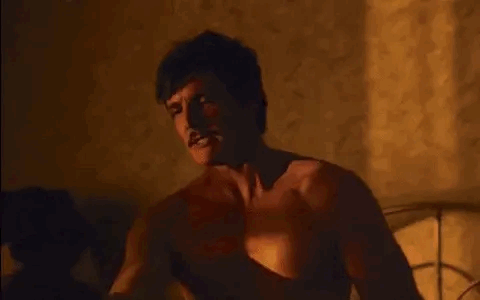
Summary: Joel comes home exhausted after working fourteen hours, but reader is in the mood. After some begging, reader gives up. Joel wakes her up in the middle of the night to give her what she asked for.
Warnings: Mature content. Porn with very little plot - like is the plot in the room with us? 18+ ONLY. MDNI. Unprotected p in v, creampie, use of the word ‘whore’ (once and reader likes it), use of ‘daddy’, dirty talk, spanking, slight ass play.
Word Count: 1,851
It’s finally Friday, your favorite day of the week. Your husband Joel usually comes home at around 4:00 PM and the two of you have takeout, watch a movie and then fuck like rabbits. Sometimes you just fuck like rabbits. Either way, your body has basically been programmed to expect dick every Friday evening.
You glance anxiously at the time on your phone - 6:55 PM. Joel should’ve been home almost three hours ago, but something had gone wrong at the job site and he had to stay and deal with it. He promised he would be home by seven, but he hasn’t even called to say he’s on his way.
Finally, at 9:00 PM, you hear Joel’s heavy footsteps on the front porch. He opens the door, a sheepish look already on his face.
“I’m so sorry baby,” he apologizes immediately. “Being the owner isn’t all it’s cracked up to be sometimes.”
“It’s alright Joel, you’re home now.”
You cross over to him and hook your arms around his neck. His arms circle your waist and he gives you a lingering kiss. You’ve been horny all day and the slight bit of affection sends you into overdrive. You try to initiate sex, but he gently pulls away from you.
“I’m sorry honey, but I’m exhausted. Let’s get some sleep and we’ll have tomorrow to ourselves, yeah?”
“Mm, pleeeease Joel? I’ll do all the work.”
“As tempting as it sounds, I’m just too tired. I worked fourteen hours today,” he protests.
“But daddyyyy,” you pout, but he puts a finger to your lips.
“No whining. I’m going to go lay down and tomorrow, I’ll fuck you all day. I promise.”
“Fine,” you agree and he kisses you again. He bids you good night and you watch a few more episodes of your favorite show before joining him.
Joel wakes up a few hours later with his cock throbbing between his legs. He tosses and turns for another half hour, trying every method he could think of to make a hard on disappear.
“I should’ve fucked her when she was begging for it,” he thinks to himself. He turns and snuggles close to you, his hard on pressed into your ass. He kisses your neck, reaching underneath your sleep shirt to fondle your breast.
“Wake up baby girl,” he whispers in your ear when you start to stir. He nibbles your ear while he rolls your nipple between his fingers and you can’t help but let out a soft moan.
“What are you doing Joel?” you giggle sleepily.
“‘M just tryin’ to give you the cock you were beggin’ me for earlier.”
“Mm, but ‘m sleepy now baby,” you whine. You don’t protest when his hand wanders underneath your panties, however. He drags his middle finger through your wetness and uses it to circle your clit.
“Seems like you could use some help t’me,” he mutters into the crook of your neck. “She’s so wet baby. She wants t’be played with.”
You drape your leg over his in response, opening yourself up to him.
“There ya go baby, let me have it,” he rasps in your ear. You whimper quietly as he rubs slow circles on your clit. He dips his finger into your entrance and marvels at just how wet you are.
“Mmm, yeah she wants it bad darlin’.”
You whine as he removes his hand from your panties and he shushes you.
“I’m gonna take care of my baby girl, don’t worry. I just wanna get you naked first.”
You feel him shuffle behind you and he turns on the lamp on his bedside table. You roll onto your back, squinting and groaning at the sudden brightness.
“Sorry, I just wanna be able to see my beautiful girl,” he says, pressing a sweet kiss to your lips. He pulls the comforter off your body and hooks his fingers in the waistband of your panties, dragging them down your legs. He tosses them aside and you sit up, pulling the shirt over your head as he sheds his boxers.
“God, you’re so fuckin’ pretty,” he compliments as he moves toward you on his knees. You lie back as he settles between your legs. You wrap your legs around his waist and pull him toward you; he collapses on top of you with a chuckle and quick kiss.
“Thought you were too sleepy,” he teases. You pull his head down for a hot, opened mouth kiss.
“Not anymore,” you mumble against his lips. “Want you so fucking bad.”
“Yeah angel? You wanna feel daddy’s cock?”
“Yes…please,” you respond. He settles onto his knees and wraps a hand around his cock. He pushes the tip through your slit, using it to rub your clit. You grip onto his forearm and moan his name as he continues using his cock to rub your clit.
“Fuck it feels good just like this,” he groans. “Might make you cum like this before I fuck you. Pussy’s so fuckin’ slick.”
You don’t protest; the head of his cock on your aching clit feels too fucking good.
“Yes, please daddy don’t stop. It feels so good, been needing you to touch me all day.”
“Aww, you needy little thing,” he coos. “Always so ready for my cock, my good girl.”
You whimper in response, head tipping back as you feel the beginnings of your orgasm approaching.
“You’re gonna cum, aren’tcha baby? I can see it on that beautiful face. Go on, let it go for me so I can stuff that tight hole.”
“Yeah baby, I’m gonna cum. Keep going just like that, I’m so fucking close.”
He slides his cock through your folds once, twice, and then on the third time, you’re coming undone.
“I’m cumming baby, fuck!”
“That’s it darlin’ - fuck baby girl, you’re gettin’ my cock so wet.”
He slaps the head of his cock on your clit as you cum, prolonging your orgasm. Once you’ve come down, he aligns himself with your entrance and pushes in slowly, groaning at the feeling of your tight walls around him.
“Always so tight f’me,” he grunts. “Fuckin’ perfect pussy made just to take my cock.”
He rocks into you slowly at first, burying his face in the crook of your neck to suck on the skin there.
“My pretty, perfect baby girl,” he whispers. “Oh baby, you feel so good.”
“Oh god,” you whimper. You hook your ankles together behind his back, allowing him to push deeper. You drag your nails down his back and he snaps his hips forward in response; he loves the stinging feeling of your nails on his skin when he’s giving you his cock. He’ll have red scratch marks for a day or two, but he loves the reminder of how good he makes his baby feel.
“Do it again,” he hisses, and you oblige. He snaps his hips forward again with a growl.
“H-harder Joel, please,” you beg.
He sits up and hooks his forearms underneath the crooks of your knees and starts pounding into you. The headboard bangs against the wall with the force of his thrusts and you grip the sheets for dear life.
“Yeah baby? Like this? You wanna get fucked like a little whore?”
“Yes daddy, oh my god!” you cry.
“Fuck yeah, take this fuckin’ cock. Such a good fuckin’ girl.”
“Keep going baby, ‘m gonna cum,” you pant.
“Rub that pretty clit for me baby,” he instructs through gritted teeth. “Cum all over daddy’s cock pretty girl.”
You reach between your bodies and rub fast circles on your clit. Coupled with his hard thrusts, the action causes you to tumble over the edge, legs shaking and wild moans escaping your throat.
“Oh my god Joel, ‘m cumming so fucking hard!”
“Oh god yeah, I feel that pussy squeezin’ me,” he moans. He pulls out when you’ve come down and strokes himself slowly.
“Turn over and throw that gorgeous ass in the air for daddy.”
You obey quickly, arching your back and giving him the best view of your ass. He smacks it appreciatively, the sting making you moan. He spreads your cheeks and whistles lowly.
“Mmm, look at that pretty little ass hole.”
He slides his cock back into your pussy and grabs your hips, setting a steady pace.
“One day I’m gonna stuff both of your little holes at the same time,” he promises. The thought makes a fresh surge of arousal course through you.
“Oh, you like the thought of that, do ya little one?” he chuckles, feeling the rush of wetness that came with your arousal.
“Yes daddy,” you whimper. He stuffs the tip of his thumb into your ass hole and you gasp.
“Feel good?” he questions.
“Yes, please leave it there,” you respond.
“So fuckin’ hot baby. Oh fuck, I love you,” he whimpers.
“I love you Joel.”
His thrusts speed up and your head falls into the pillow below you, muffling your sounds. He grips your hair and pulls hard enough to lift your head.
“Keep that head up. I wanna hear how fuckin’ good I’m makin’ you feel.”
“Yes daddy,” you obey. He doesn’t release his grip, however, and with his hand in your hair and his thumb in your ass, you cum hard around him.
“Oh shit, oh shit, I’m cumming daddy!” you wail.
“Yeah baby, that’s my good girl. Daddy loves listening to you cum.”
He fucks you through your orgasm and keeps pounding into you until you’re having another. He spanks you repeatedly while your pussy clenches around him and you babble mindlessly about how good his cock is.
“I know baby, and you take it so well,” he smirks. “Best god damn pussy I’ve ever fucked.”
“Mmm, fuck, I can’t stop cumming,” you moan as a fifth orgasm hits. “Oh god daddy, I’m cumming so good.”
“That’s my fuckin’ girl,” he grits out. “Fuck, I’m gonna unload right in this little pussy. Gonna fill you so full of my cum. My balls are so fuckin’ heavy.”
“Yes daddy, give it to me. Give me your cum.”
His thrusts become sloppy until an animalistic sound tears from his chest. He grips both hips as his balls tighten and ropes of cum fill your pussy.
“Baby girl,” he rasps. “God damn, I’m blowing a fuckin’ load in your pretty pussy.”
You feel some of his cum trickle down your thigh, but he doesn’t stop.
“Fuck baby, it’s already spilling out and I’m not - nnngh - not done yet.”
He finishes with a final thrust and pulls out of you gently. Cum immediately starts dripping from your spent hole and he gets up to grab a towel. He cleans off your thighs and wipes off his dick before finding your panties and helping you into them.
“Keep as much of me in there as you can baby,” he says, patting your clothed pussy. He settles into bed behind you and wraps his arm around your waist.
“Get some sleep my love,” he whispers in your ear. “I still intend to keep my promise about tomorrow.”
#joel miller#pedro pascal#joel miller smut#pedro pascal smut#the last of us#tlou hbo#tlou series#tlou smut
2K notes
·
View notes
Text
Birthday Boy | j.jk


-> pairing. wolf shifter!jungkook x human!reader (f)
-> genre. tooth rotting domestic fluff, birthday celebration, found-family, established relationship
-> rating. 13+
-> w/c. 846
-> warnings. Kinda suggestive at the start 😭👍🏻
-> a/n. Self-indulgent birthday JK fic <33
-> collection. mini-series
-> started. Sun., Sept. 1st, 2024 @ 09:41
-> fin. Sun., Sept. 1st, 2024 @ 16:55
-> edited. Sun., Sept. 1st, 2024 @ 18:46
-> divider credit. @mmadeinheavenn


Jungkook wakes to the unmistakable feel of your lips around his earlobe.
“Mmng…”
Your giggles tickle his ear as you trail your lips over the underside of his jaw, dotting wet little kisses all across his throat. “Morning.”
Jungkook hums appreciatively, tilting his head back for easier access, his hands making their way to your hips when you give his Adam’s apple a sweet little nip.
“Bunny,” he mumbles, forcing himself to slow-blink his eyes open.
“Mm?” You kiss him (finally), gently pulling his lower lip between your teeth before leaning back down to press your foreheads together, mouths a hairsbreadth apart.
This is Jungkook’s favorite thing, he thinks. He wishes he could stay in bed with you forever… but, knowing you, you definitely had something a little extra prepared.
He smiles into your mouth, giving you a quick peck before leaning up to nuzzle against your cheek. “G’morning,” he sighs contentedly.
You giggle again, using his chest to push yourself up into a sitting position. “Sleep well?”
He nods, laughing when you smooth over his hair with your hands, cupping and squeezing his cheeks together while growling about your cuteness-aggression.
“Thank you,” he mutters through forced duck-lips, rubbing gentle circles against your exposed hips.
You frown. “For?”
“Gift,” he says. “Waking up like this…”
You scoff, gently smacking his chest before swinging your legs over the side of the bed like you’re dismounting a horse, pulling your (his) shirt down over your stomach so it rests across your thighs. “Idiot. This is a cherry on top.”
You walk across the room, rummaging around the drawer for a pair of shorts. “Get up and get ready.”
Jungkook frowns as he sits up, picking the sand from the corners of his eyes. “Huh?”
“We’re going shopping.”
“Isn’t that something you’d wanna do for your birthday?”
“Har-har, babe. Very funny.”
Jungkook grins, watching you with sparkling eyes as you come back to him, grabbing his jaw between your fingers and giving his puckered lips a firm smooch. “I got us tickets to Deadpool and Wolverine.”
“YOU DID WHAT?!”
🌕🌖🌗🌘🌑🌒🌓🌔🌕
“The Honda Odyssey fucked hard,” Jungkook gushes, swinging your hands back and forth as he takes a bite out of his ice cream.
You laugh fondly, biting into your sweet sugary cone. “The choreography was phenomenal,” you agree.
“Right?! Ugh—“ He kisses your cheek, pulling away with a cute little mwah that makes you involuntarily smile. “Thank you so much for today. Seriously. I couldn’t have asked for anything better.” He smiles and squeezes your intertwined hands, taking another bite out of his ice cream.
“Always, Kook.”
He briefly lets go of your hand to reach into your back pocket for the apartment keys, twisting it in the lock and pushing it open while trying to catch the melting ice cream on his tongue, giving you a sly grin over his shoulder.
“Although, I might have one other thing in mind for tonight—“
“Surprise!”
Jungkook flinches in surprise as the apartment lights flash on, party streamers flying across the room as the pack come jumping out behind every nook and cranny they managed to squeeze themselves into.
“Happy birthday, brat,” Jennie grabs Jungkook by his neck and digs her knuckles into his head, laughing as Rosé pulls her off so she and Lisa can wrap their arms around him.
Jisoo fondly shakes her head, giving the younger girls a chance to finish greeting their maknae before hugging him herself, followed quickly by Taehyung, Jimin and Hoseok who all collectively dogpile Jungkook (so much so that he nearly falls over).
You laugh as you close the door behind you, watching with a burning heart as the pack envelop him in their arms, loud and rowdy and full of love.
“Yah! Make room, you rascals! Stop hogging my son!”
Jungkook’s eyes widen, the tears that’d been slowly building in the corners of his eyes finally flowing down his cheeks at the sight of his mom and dad.
“Eomma,” he whispers, falling into her arms as she wraps her arms around his shoulders, cooing at him like all mothers do.
He pulls away and grasps onto his dad’s shoulder as his mom wipes at his tears, scolding him for making her emotional. “Appa,” he sniffles, hugging them both again, his dad laughing as he tries not to cry himself.
They hadn’t been able to see each other in months, and Jungkook had seemed so sad when they said they wouldn’t be able to make it. You couldn’t let that happen, so you pulled a few strings to get them off work and up to Seoul.
You can’t help the strong pulling sensation in your chest, your love for this family so close to spraying out of you in a wave of bright, iridescent light.
And despite the tears streaking across his cheeks, Jungkook’s happiness radiates like a sun radiates heat—strong and all encompassing.
He looks at you over his father’s shoulder, a tearful, loving smile on his face. Thank you, he mouths. I love you.
I love you, you whisper.
Happy birthday.


<- prev | next ->
#jungkook x reader#bts x reader#jungkook smut#bts smut#bts fluff#jungkook fluff#jeon jungkook x reader#kpop fanfic#kpop fic#ao3#bts fanfic#bts fanfiction#kpop fanfiction#bts fic#kpop x reader#a/b/o dynamics#wolf shifter#werewolf au#bts werewolf au#wolf shifter jungkook#werewolf jungkook#jungkook fic#jungkook fanfiction#jungkook fanfic#ao3 fanfiction#archive of our own#a/b/o au
259 notes
·
View notes
Note
Hi! A lot has already been written about Robespierre's relationship with both Camille and Saint-Just, but I would be really curious to learn more about his relationship with Pétion that you've mentioned!
Specifically if there is any evidence that we know of that indicates any strong feelings or possible romantic involvement. I'd also be interested to know how their relationship transformed over time, since they ultimately ended up on opposing sides?
Thank you in advance citoyen!

Pétion and Robespierre met for the very first time after the convening of the Estates General in May 1789 to which both had been elected members, Pétion in March, Robespierre in April. Using Oeuvres complètes de Maximilien Robespierre, I’ve tracked the first instance of the two getting mentioned together to May 20 1789, when the journal Le Point du Jour describes a debate on the publication of municipal minutes both have taken part in:
In the debates occasioned by this motion, great talents already known, such as those of MM. Target and Mirabeau fulfilled the expectations one had created. Others, like those of MM. Barnave, Chapelier, Pétion de Villeneuve and Robespierre, manifested themselves in a striking manner.
Using the same source, along with Poursuivre la Révolution : Robespierre et ses amis à la Constituante (1994), it can be observed that Pétion and Robespierre from this moment up until the closing of the National Assembly in September 1791 fought side by side in a number of big discussions — the question of war and peace (May 16-22 1790) where both supported the motion that the Assembly alone should hold the right to declare war and king should be deprived of it, the colonies (May 11-15 1791), where both were among the 27 deputies speaking in favor of free men of color, the organisation of the national guard (27-28 april 1791), a body to which they argued both active and passive citizens should belong, the abolition of lettres de cachet (13-16 March 1790) as well as that of the silver mark and land ownership (August 1791), the non-eligibility of National Assembly deputies to the next Legislature (May 16 1791) an idea Robespierre himself had come up with, and the question of the death penalty (May 30 1791), were both were among the rare ones to ask for its complete and total abolition. Pétion and Robespierre are found agreeing on a multitude of smaller topics as well, such as the sanction of the Declaration of the Rights of Man (October 2 1789), the treatment of bishops in office (June 22 1790), the inviolability of deputies (June 25 1790), the massacres of La Glacière (16-18 November 1790), police functions (December 28 and December 30 1790), the power of the colonial committee (January 11 1791) the organisation of the justice system (February 5 1791), the organization of administrative bodies (March 3 1791), an extradition request from the court of Vienna (March 5 1791), appointment of national treasury administrators (March 9 1791), the judgment of disputes in electoral matters (March 13 1791), the right to inheritance (April 1 1791) and the right to petition (May 9 and May 10 1791).
All these shared battles of course led to the two often getting mentioned side by side in the evergrowing press. Over the first two years of the National Assembly’s existence, these mentions mostly just consist of Pétion and Robespierre both getting listed as two of several deputies of the far left, alongside people such as Mirabeau, Barnave, Lameth, Duport, Buzot, and Grégoire. The first instance of someone describing Pétion and Robespierre as a unit while also seperating them from their fellow radical deputies that I’ve found is from December 13 1790, when Desmoulins writes the following in number 55 of his Révolutions de France et de Brabant:
One cannot speak about Robespierre without thinking about Péthion [sic].
This tying together of the two deputies and their cause was in the following months to do nothing but grow among the journalists. Desmoulins himself would go on to declare that ”it is only Péthion and Robespierre that I have constantly praised, because every man of good faith will agree that they have always been irreproachable” (number 69, March 21 1791) and that ”we must always come back […] to the system of Robespierre and Péthion: perish the colonies, rather than the principles!” (number 77, May 16 1791). In number 472 (May 28 1791) of of l’Ami du Peuple, Marat describes the National Assembly as consisting of ”two hundred men too narrow-minded to know what they are, and one or two honest men who have never wanted anything other than the general good. Such are Péthion [sic] and especially Robespierre,” and three days later, in number 475, he reveals that ”If I were tribune of the people […] I would give Péthion [sic] and especially Robespierre a civic crown.” In number 783(October 2 1791) of Le Patriote Français, Brissot called Pétion and Robespierre ”the two Catos of the Constituent” and a few days later Louis Marie Prudhomme expressed himself in similar terms, writing ”Péthion [sic], Robespierre and the small group of their like, did not fail to embarrass their adversaries so powerful in number and means: more than once their presence reminded that of Cato to the licentious spectators of Rome” (Révolutions de Paris, number 117).
The image of the two as inseparable was even stronger in the different Jacobin clubs scattered across the land. On April 17 1791 it was discovered that one of them had placed busts of Pétion and Robespierre next to that of the recently deceased Mirabeau, contrary to the rule that no busts of living people would be displayed in the clubs. On July 13 1791, one M. Sigaud read a letter to the parisian Jacobin club signed by 300 people wanting to ”give thanks to MM. Pétion and Robespierre, for having announced the greatest courage in the defense of the people. They will threaten you with daggers, with death: fear nothing, their daggers will only be able to penetrate you through the rampart of our bodies. Our arms, our hearts, our lives, everything is yours.” Two weeks after that, July 25 1791 Tallien exclaimed to the same club that ”Where Pétion and Robespierre are, are the true friends of the Constitution,” and three months later, October 10 1791, he held a speech where he said that ”the names of Pétion, of Robespierre, and of of those who, like them, have well served their fatherland, must be the rallying sign of all patriots; we always see them on the path of honor, and, by following in their footsteps, we are sure not to go astray.” On April 30 1792, Simond told the jacobins that ”MM Pétion and Robespierre” were the best revolutionaires, ”because there are no individuals who have figured like them in our revolutionary splendors.” In Nouveau Tableau de Paris (1797), Louis Sebastien Mercier remembered how Pétion had been the ”inseparable friend of Robespierre, their principles were then so consistent and their intimacy so marked, that they were called the two fingers of the hand. They continued to be placed under the same accolade until the end of 1792,” while Robespierre’s sister Charlotte wrote in her memoirs (1834) that her brother during the National Assembly ”was closest with Pétion, whose popularity then equaled his. They […] fought for the cause of the people, like two generous imitators who looked to surpass each other in noble sentiments.”
In spite of all this, it’s not until December 1790 I’ve been able to for the first time find Pétion and Robespierre together with a backdrop that’s not political, as they on the 25th and 27th of that month signed the wedding contract and attended the wedding ceremony of Camille and Lucile Desmoulins, Camille reporting to his father that ”I had as witnesses Péthion [sic] and Robespierre, the elite of the National Assembly, Sillery, who wanted to be there, and my two colleagues Brissot de Warwille and Mercier, the elite among the journalists. […] The dinner was at my house, only M. and Mdm Duplessis, their daughter Adèle, the witnesses and the celebrant.” Two months later, March 3 1791, Sillery writes to the same Camille that ”Madame de Sillery is coming to dine at my house with Pétion and Robespierre, I dare to ask your lovable and beautiful wife to do me this honor as well.” Yet another month later, April 3 1791, Robespierre made the motion that the recently deceased Mirabeau be buried in the Panthéon. In his memoirs (written 1793), Brissot claimed that ”Pétion reproached [Robespierre] for it the same day, he reproached him for it in my presence.” According to number 72 of Révolutions de France et de Brabant, Pétion was indeed the only deputy that didn’t attend Mirabeau’s funeral on April 5 1791. Finally, in 1850, Louis Philippe told John Wilson Croker that he at some point during the National Assembly had been at a dinner where the two deputies where — ”Pétion was big and fat, good-humoured and talkative, but heavy withal. He talked on, Robespierre said not a word, and I took little notice of him, he looked like a cat lapping vinegar. Pétion was rallying him on being so taciturn and farouche, and said they must find him a wife to apprivoiser him: upon which Robespierre opened his mouth for the first and last time with a kind of scream, ”I will never marry!” (The Croker Papers: the Correspondence and Diaries of the late right honourable John Wilson Croker… (1885) volume 3, page 209).
On June 10 1791, Robespierre was elected to become the future public prosecutor of the Paris criminal tribunal. Three days later, Pétion was chosen as president of the same body, after the first three elected deputies had all resigned. These new posts are the subject of the very first conserved letter exchanged between the two, dated 15 June 1791. Pétion writes the following to Robespierre using vouvoiement, the form the two are always recorded to have used with one another:
You probably know, my friend, about my appointment. I accept. I don't count having you as a colleague as something small. What scared Duport away is what attracts me. I looked for you in the hall and didn't see you. I wanted to go to your house, but I said to myself: I won't find him, he never dines at home. Buzot is a substitute and accepts. Be well, all yours. This Wednesday evening. Pétion.
There’s also the following letter from Pétion to Robespierre, that it too has to do with the latter’s position as public prosecutor. It is unfortunately undated, but Correspondance inédite de Maximilien et Augustin Robespierre (1910) traces it to June 1791 as well:
My friend, I violate the decrees, I become solicitor. It is true that my offense is not within the competence of the assembly. I ask you in the name of my relative, my friend and my host the right to supply medicine to the poor sick prisoners. I was told that this concession was within your competence. I don’t know anything about it. All yours. This Friday evening.
Just six days after Pétion had penned the first letter down, June 21, Paris woke up to the discovery that the royal family had fled the capital during the night. In number 82 of Révolutions de France et de Brabant, Desmoulins described how he and others the very same day had brought a woman with information to give about the escape to the Jacobin Club, in the hopes that her testimony would get Robespierre to denounce Lafayette and Bailly. At first, Robespierre seems quite willing to go through with this, but when Pétion shows up and shows his disapproval of the idea he is quickly taken aback:
The section immediately named a deputation of 12 members, and we took this woman to the National Assembly. Robespierre and Buzot, whom we consulted, were carried away by the assured countenance of the witness, and by the whole of the testimony; but they were greatly perplexed as to the measures to be taken. All the members of the assembly were against revolutionaries, some without knowing it, but many knowingly, and the others out of fear. We will be, they said, pushed back from the tribune, referred to the research committee, and our accusation will be entered in this mortuary register of denunciations. Péthion [sic] came, and increased the embarrassment, and stopped Robespierre, who, at first, was quite disposed to take away the reputation of Bailly and La Fayette by assault.
In her memoirs, Madame Roland claimed to the very same day have seen Brissot and Robespierre at Pétion’s house (on rue du Faubourg-Saint-Honoré n. 6, today roughly a one hour walk from Robespierre’s apartment on rue de Saintonge 30) discussing the flight:
I was struck by the terror with which [Robespierre] seemed to be overcome on the day of the king's flight to Varennes; I found him in the afternoon at Pétion’s; where he said with concern that the royal family would not have taken this course without having a coalition in Paris which would order the Saint-Barthélemy of the patriots, and that he expected to be dead within twenty-four hours. Pétion and Brissot said, on the contrary, that the flight of the king was his loss, and that it was necessary to take advantage of it; that the dispositions of the people were excellent; that it would be better enlightened on the perfidy of the court by this approach than it would have been by the wisest of writings; that it was obvious to everyone, by this fact alone, that the king did not want the constitution he had sworn to; that it was time to ensure a more homogeneous one, and that it was necessary to prepare minds for the Republic. Robespierre, sneering as usual and biting his nails, asked what a Republic was!
In the night between June 21 and 22 the royal family was stopped in Varennes, and four o’clock the next morning, Pétion, alongside Barnave and Maubourg, left the capital to escort them back. They reached Paris again on June 25. The escape attempt resulted in massive discontentment and demands that the king abdicate. On July 15, a petition written by a certain Massoulard, asking the assembly to suspend “all determination on the fate of Louis XVI until the well-pronounced wish of the entire Empire has been expressed” was brought to the National Assembly. In Lettre de J. Pétion à ses Commettans sur les Circonstances Actuelles, released later the same month, Pétion described how he and Robespierre had held these petitioners off, saying that since the Assembly had voted to keep the king on the throne the very same day, a petition was out of order:
I will say, since the occasion presents itself, that only once in this affair was a relationship established between the citizens gathered on the 15th of this month at the Champ-de-Mars and myself. These citizens had drawn up a petition for the National Assembly; commissioners carried them; they were charged with speaking to those who had risen against the project of the committees, to Grégoire, Robespierre, Prieur and myself, to be their organs with the assembly, and to negotiate their entry to the bar. M. Robespierre and I left the room to listen to these commissioners; and we told them that this petition was useless, that the decree [to keep the king on the throne] had just been passed. They asked us for a word to see that they had fulfilled their mission; we wrote a letter which breathes the love of order, of peace, and which, I believe, has been able to prevent misfortunes.
When Pétion, Robespierre and Rœderer entered the Jacobin club’s evening session the very same day they got covered in applause. Both were there again on both July 16, putting their signatures on a letter to the sister societies in the provinces about liberty of the press and the elections for the upcoming Legislative Assembly, as well as on July 17 and 18, this time dealing with the mass walkout (that left the two and a handful more as the only National Assembly deputies still members of the Jacobins) following the founding of the Feuillants club the previous day. Desmoulins, who was also present at the session on the 17th, stated that he didn’t want any writing to say the Jacobins were splitting from the National Assembly since, ”certainly, where MM. Robespierre and Pétion are, there is no split with the National Assembly.”
Pétion would later recall how afraid Robespierre had been during these days. In J. P. Brissot, député à la Convention nationale, à tous les républicains de France; sur la société des Jacobins de Paris (1792) Brissot even accused Robespierre of having ”secretly proposed fleeing to Marseille to Pétion.” If that is a charge that should be taken with a grain of salt, it was nevertheless during these same days Robespierre changed address and took cover with the Duplay family on Rue Saint-Honoré 366. In her old days, the family’s youngest daughter Élisabeth claimed Pétion would frequent the house ”in the early days.” The year after the move Robespierre himself would nevertheless write that it wasn’t until August 7 1792 Pétion for the first time set his foot in the house (see below).
On September 30 1791, the National Assembly was finally closed to be replaced by the Legislative Assembly. Several journals described the triumphant exit Pétion and Robespierre made from there the very same day, getting met by cheers, applauds and cries of joy from a huge crowd who offered them so called ”civic crowns,” before the two climbed into a carriage (a ”humble” one according to Révolutions de France et de Brabant) and rode off together to the sound of fanfares. Here is the description given by Le Thermomètre du Jour:
Pétion and Robespierre came out last, arm in arm. Citizens with oak crowns tied with tricolor ribbons in their hands embraced them and said to them: ”Receive the price of your good citizenship and your incorruptibility; we give, by crowning you, the signal to posterity”; and the applause, the bravos, the shouts of ”long live Pétion and Robespierre! Long live the spotless deputies!” mingled with the chords of military music placed on the terrace of the foliage, filled all hearts with the sweetest intoxication. In vain, the two legislators wanted to hide from these testimonies of public recognition: as they fled, a young lady whom they met on the stairs which lead to the storage room said to them: ”allow at least that my child embraces you”; and this they could not resist. To escape the chorus of applause who were pursuing them, the two deputies, who had taken refuge in a house in the rue Saint-Honoré, got into a carriage. Immediately, in the delirium of enthusiasm, the horses were unhitched, and a thousand biases hastened to drag the carriage; degrading idolatry, of which those who were the object of it were afflicted and indignant. At this moment the honorable Robespierre, seized with holy indignation, hastily alighted from the carriage. “Citizens, he said, what are you doing? What humiliating posture will you take? Is this the price of my work for you for two years? Don't you already remember that you are a free people?” And he quickly got back into the carriage where his worthy colleague was. The attitude and admiration of the citizens at this moment cannot be described: sublime spectacle! You make delicious tears flow. One let the carriage roll off to the sound of fanfares, applause, cries and the most energetic blessings. May those who could have deserved such a triumph dry up in spite, comparing this excess of gratitude to the silence of contempt, or to the curses of hatred who accompanied them. Above all, may this touching example produce Pétions and Robespierres in the new legislation.
This celebration might very well have been the follow-up of an intervention made at the Jacobin club on September 25 by one Varnet, who asked for ”a civic feast rewarded by the grateful parties to MM. Robespierre, Péthion [sic], etc, much more fraternal than all these royal celebrations which recall the ancient idolatry of the Badauds.” These would not be the homages paid to the two in the wake of the closing of the National Assembly. On October 9, the Jacobin club of Strasbourg decided to send each of the two a civic crown, as revealed in a letter with 400 signatures published in number 231 of Mercure Universel (October 17 1791). On November 6 1791, Annales patriotiques et littéraires could reveal that the club of Saint-Laron ”has informed that of Paris of the tribute of homage which it has paid to Pétion to Robespierre, and of the annual festival which it established in their honor, to teach, it said, to children that a glance from the people is better than the caresses of kings,” on October 27 the club in l’Orient reported (in a letter published in number 123 of Révolutions de Paris) that ”the names of Robespierre and Péthion [sic] are in veneration among [its members],” and on October 18 the club of Lyon sent Pétion and Robespierre an open letter thanking the two for all their services.
Shortly after the closing of the National Assembly Pétion left for London, but not before he was able to hand a report written by him on patriotic societies to Robespierre, which the latter then read to the jacobins on October 5. When Robespierre too left the capital for Arras a few days later, Pétion’s shadow clearly accompanied him. In a letter to Maurice Duplay dated October 16 he could joyfully report the following:
At Arras itself, the people received me with demonstrations of affection which I cannot describe, and the thought of which still warms my heart. Every possible means was used to express it. A crowd of citizens had come out of town to meet me. They offered a civic crown, not only to me, but to Pétion as well, and in their cheers the name of my friend and companion in arms was often mingled with my own.
A month later, November 17, Robespierre writes to Maurice again:
…I think with sweet satisfaction about the fact that my dear Pétion may have been appointed mayor of Paris as I write. I will feel more keenly than anyone the joy that every citizen should be given by this triumph of patriotism and frank honesty over intrigue and tyranny.
Robespierre came back to Paris on November 28. One of the first things he did was go and dine at the house of Pétion (who he here goes so far as to call his family), as revealed by a letter to Antoine Buissart he wrote two days later:
With what joy we met again! With what delight we embraced! Pétion occupies the superb house inhabited by the Crosnes, the Lenoirs: but his soul is always simple and pure: the choice of him [as mayor] alone would suffice to prove the revolution. The burden with which he is charged is immense; but I have no doubt that the love of the people and its versus gives him the necessary means to carry it. I'm having dinner at his house tonight. These are the only times when we can see each other as a family, and talk freely.
Following Pétion’s election to mayor, his apperances in public become much fewer compared to his time as deputy of the National Assembly. Robespierre on the other hand could not get enough of praising his friend at the Jacobin club. On February 10 1792, he held a speech in which he cried out the following, apropos of suggesting holding a ceremony at the Champ-de-Mars and making a sacrifice on the altar of liberty:
O Pétion! You are worthy of this honor, worthy of deploying as much energy as wisdom in the dangers that menace the fatherland that we have defended together. Come, let us mingle our tears and weapons on the tombs of our brothers, remind ourselves of the pleasures of celestial virtue, and die tomorrow, if need be, from the blows of our common enemies.
Five days later, in his inaugural address as public prosecutor, Robespierre called Pétion ”the one of all my colleagues to whom I was most closely bound, by works, by principles, by common perils, as much as by the ties of the most tender of friendships,” and says it was due to Pétion’s advice that he was taken aback from proposing that National Assembly deputies not only be barred from serving on the Legislative Assembly, but also be excluded from any public offices at all following the start of said assembly. He then eulogized his friend once again: ”I swear that it is he who, up until this moment, has saved the capital and prevented the horrible plans of the enemies of our liberty; I swear that the courage and virtues of Pétion were necessary for the salvation of France.” A month after that, March 19, Pétion sent the Jacobins a letter disapproving of the recent usage of the so called ”bonnet rouge” among the club’s members. After the letter had been read out, Robespierre stood up and supported his motion, and together, the two succeded in getting the bonnet rouge depositioned from the Jacobin Club:
I respect, like the mayor of Paris, all that is the image of liberty, I will even add that I saw with a great pleasure this omen of the rebirth of liberty; however; enlightened by the reflections and by the same observations made by M. Pétion, I felt urged to present to society the reasons which have just been offered to you, but as I have only patriotism to fight with, I am charmed to be guided by M. Pétion, by a citizen whose civility and love for liberty is foolproof, by a citizen whose heart is ardent and whose head is cold and thoughtful, and who brings together all the advantages, talents and virtues necessary to serve the country, at a time when the most skillful and astute enemies can deal it disastrous blows.
And yet another month later, April 13 1792, Robespierre defended Pétion against attacks of unnamed enemies:
The mayor of Paris, they say, is ambitious; we are arsonists who slander the constituted authorities to elevate our ambition at the expense of others; well, prove it. Our goal has been to fight in the constituent assembly all the parties of tyranny, Pétion and I have done it, were it even the means Pétion would guarantee, far from foreseeing then that our principles would triumph over a cabal if strong, we believe that after the constituent assembly we would be immolated and that the principles of our ancestors would be adopted: I saw Pétion, at the time when he was brought to the position of Mayor of Paris, two months before his appointment, at a time when we can remember that the votes of the good citizens floated between him and me, I saw the mayor of Paris determined not to accept this place; he read the same feelings in my heart, and when he accepted it, I guarantee to the whole nation that he only did it because he had only considered it as a terrible pitfall for the citizen who would occupy it in such a stormy circumstance for the public good.
Despite Pétion’s massive new workload, he and Robespierre still found the time to see each other, albeit with work still being the main topic of discussion. In Réponse de Maximilien Robespierre à Jêrome Pétion (November 1792), Robespierre recalled that ”Last January to June, when the ministers were renewed, I saw you (Pétion) in the firm belief that it was you who had chosen them. As I asked you if this action of the court was not suspicious to you, you replied, with a very remarkable air of consent: “Oh! if only you knew what I know! If only you knew who nominated them!” I guessed you, and I said to you, laughing at your good faith: “it’s you, perhaps.” And then, rubbing your hands, you responded: “Hem, hem,” No matter how much you persisted in confirming this fact to me, I didn't want to believe it. I esteemed you too much to suppose that you would have the necessary credit with Louis XVI and his courtiers to give him ministers.” Somewhere after Robespierre was sworn in as public prosecutor, the two also co-authored the pamphlet Observations sur la nécessité de la reunion des hommes de bon foi contre les intrigues par Jérome Pétion, Maire de Paris; et Maximilien Robespierre, Accusateur Public du département de Paris.
But all while this ”bromance” was playing out, so too was the debate on whether or not France ought to go to war. It’s most influential voices were Robespierre on the anti-war side, and Pétion’s childhood friend and freshly baked member of the Legislative Assembly Brissot on the pro-war side. Pétion himself would appear to have stayed neutral in the conflict, I have at least not been able to find any instance of him speaking his mind on the topic. But on April 25 1792, five days after France had declared war on Austria, he adressed the following letter to Robespierre, regretting the session at the Jacobins held the same day, during which Brissot’s ally Guadet had loudly denounced Robespierre, calling him an ”imperial speaker […] who constantly puts his pride before public affairs, the position to which he was called”, after which Robespierre had requested time to properly respond, something which he was granted. Pétion does however not attack Guadet for saying what he had said about Robespierre, instead confining himself to lamenting division in general in a time when external war has just been declared:
The session which took place yesterday [sic] at the Jacobins saddened me. Is it possible that we’re tearing ourselves apart like this with our own hands? I don't know what demon thus blows the fire of discord. What! It is when we are at war with the enemies without that we will stir up trouble within. The Society most useful to the progress of the public spirit and of liberty is on the point of being torn apart. We suspect each other, we insult each other, we slander each other, we accuse each other respectively of being traitors and corrupt. Perhaps if the men who present themselves thus were to see themselves in the open they would esteem each other. How hideous human passions are. What, we can't have the calm and energy of free men? We cannot judge objects in cold blood, we scream like children and are furious. I truly tremble when I consider who we are and always wonder if we will retain our freedom. I haven't rested all night, and have only dreamed of misfortunes. A grace, my friend, be aware of the split that is preparing itself. Caution and firmness. I see there men who seem to have the most fervent patriotism and whom I believe to be the most perverse and corrupt men. I see others who are only stunned and inconsequential but who do as much harm by levity as others by combination. Irritated self-esteem, deceived ambitions play the biggest game. When we reach port, must storms arise and the ship run the risk of crashing against the rock? Think about it seriously. Redouble your efforts to get us out of this mess. Be well. Your friend. Pétion.
On April 27 1792, Robespierre could deliver a speech by the name of Réponse de M. Robespierre, aux discours de MM. Brissot & Guadet du 25 avril 1792 in response to what Guadet had said about him two days earlier. In it, he stated among other things that the things the two reproached him for ”are precisely the same charges brought against me and against Péthion [sic] last July by Dandré, Barnave, Duport, La Fayette!” Something which the authors of the journal Chronique de Paris picked up on when recounting the speech:
…Before finishing, [Robespierre] had taken care to name M. Pétion, and to establish between them a community of ideas, a relation of feelings on the objects which divide the society. He knows very well that M. Pétion is far from approving his follies, or rather his fury, but he also knows that he could not disarm him without losing a large part of his popularity, so the goal was not missed, and Robespierre's party was swelled with all the worthy friends of the worthy Pétion.
Two days after that, April 29 1792, Pétion writes yet another letter to Robespierre:
My friend, I will go to the Jacobins tonight and ask to speak. I will not speak of people, but of things. I will set forth principles and I will come to conclusions suitable for restoring peace. The situation of this society is getting worse day by day. After having rendered such important services, when it can render still more important ones, it would be terrible if it gave the scandalous example of a split. The spirits are very irritated. One becomes the fable of all malicious people, the newspapers are tearing this Society apart, tearing its members apart, we must put an end to all writings. Your friend, Pétion.
Pétion did indeed show up to the Jacobins the very same day, where he, according to the minutes, ”made a long motion of order tending to maintain the union in the Society, and asked that all these quarrels be moved on from.” Right after the club had ordered the speech printed, Robespierre tried to take the floor but was refused by ”girondin” president Lasource. The next day, he once again attempted to speak against Brissot and Guadet, underlining that ”I want to keep to the limits fixed by M. Pétion,” but that his approach had been turned against them by��”libelists, directed against him, against me, against this society and against the people itself.” Robespierre again insists on a closeness between him and Pétion:
I know he is horrified of plots hatched against me: his heart has spilled over into mine; he cannot see without shuddering these horrible calumnies which assail me from all sides.
But his thoughts did not gain any approval from the jacobins this day either, and Robespierre instead opted to found a journal — Le Defenseur de la Constution — to attack his enemies from instead. When mayor Pétion and Procureur de la Commune Manuel got temporarily suspended from their duties on July 6 and arrested on July 7, for complicity in the demonstration of June 20, Robespierre used number 9 (July 14 1792) of said journal to defend them (in Réponse de Maximilien Robespierre à Jérôme Pétionhe confidently reminded him that ”no one more than me defended you in a more public and more loyal manner, against all the harassment [the court] brought upon you.”) On July 13, when the suspension of Pétion was lifted, ”M. Robespierre, while applauding [the decree], points out, however, that this should be less a cause for rejoicing as there are reasons for the true friends of liberty to grieve the fact that this decree was postponed for a fortnight.”
In Réponse de Maximilien Robespierre à Jérôme Pétion (November 30 1792), Robespierre reported about the following meeting (that Pétion also confirmed when later responding to him) the two had had, roughly a month after Pétion had been returned to duty, on the topic of popular insurrection:
On August 7, I saw the mayor of Paris enter my house; it was the first time that I received this honor, although I had been closely connected with you. I conclude that a great motive brings you; you talk to me for a whole hour about the dangers of insurrection. I had no particular influence on the events; but as I quite often frequented the Society of the Friends of the Constitution, where the members of the directory of the federates habitually went, you urged me earnestly to preach your doctrine in that society. You told me that it was necessary to defer resistance to oppression until the National Assembly had pronounced the deposition of the King; but that it was necessary at the same time to leave him the leisure to discuss this great question with all possible slowness. You could not, however, be sure that the court would adjourn the project of slitting our throats for as long as it pleased the National Assembly to adjourn the forfeiture; and everyone knew that the royalist party was then dominant in the Legislative Assembly; and your Brissot and his friends had delivered long speeches on this question, the sole object of which was to prove that it was necessary to retreat from it, and ceaselessly to postpone the decision. You even know what public disfavor their equivocal conduct had incurred; they saw in it only the project of frightening the court by the fear of an insurrection, in order to force it to take back ministers of their choice. I could have made these comparisons myself; but such was still my confidence in you, and, if it must be said, the feelings of friendship which your unexpected step aroused in my heart, that I believed you up to a certain point; but the people and the federals did not.
Two days later, the insurrection of August 10 took place. Pétion’s behavior during this night would become a big subject of quarrel between him and Robespierre in the months to come. Two days after the insurrection, August 12, Robespierre begun to serve at the so-called Insurrectional Commune. The power struggle between this body and the Legislative Assembly would it too serve as cause for conflict between the two. Already on Robespierre’s second day at the commune, August 13, Pétion and Manuel came there, having just escorted the royal family to their new prison in the Temple. Giving an account over this mission, the two stated that the place ”did not seem suitably arranged,” and that the king should be kept somewhere else instead. Later during the session, Robespierre claims (I can’t find this recorded in the session’s actual minutes) that Pétion presented a report from the Legislative Assembly to within 24 hours dissolve the commune and replace it by the old municipality, a proposal which got rejected. He would later reproach Pétion for both of these things.
According to J.M Thompson’s Robespierre (1935), on August 17 Robespierre was commissioned by the commune to interview Pétion to get him to co-operate (I can’t find this in the commune’s minutes either). The interview did however not go that well, resulting in the following letter from Pétion to Robespierre, written on August 20:
You know, my friend, what my feelings are for you, you know that I am not your rival, you know that I have always given you proofs of devotion and friendship. It would be useless to try to divide us, you would have to stop loving liberty in order for me to stop loving you. I have always found more fault with you to your face than behind your back. When I think you too ready to take offence, or when I believe, rightly or wrongly, that you are mistaken about a line of action, I tell you so. You also reproach me for being too trustful. You may be right; but you must not assume too readily that many of my acquaintances are your enemies. People can disagree on a number of unessential points without becoming enemies; and your heart is said to be in the right place. Besides, it is childish to take offence over the things people say against one. Imagine, my friend, the number of people who utter all lands of libels against the mayor of Paris! Imagine how many of them I know to have spread damaging reports about me! Yet it doesn’t worry me, I can assure you. If I am not totally indifferent to what others think about me, at least I value my own opinion more highly. No… you and I are never likely to take opposite sides: we shall always hold the same political faith. I need not assure you that it is impossible for me to join in any movement against you: my tastes, my character and my principles all forbid it. I don’t believe that you covet my position any more than I covet that of the king. But if, when my term of office comes to an end, the people were to offer you the mayoralty, I suppose that you would accept it; whereas in all good conscience I could never accept the crown. Look after yourself, let us march forward, we are in a situation threatening enough to force us to think only of the public good.
As can be seen, Pétion was still trying to salvage the relationship that had begun to deteriorate already in the spring, an effort that Robespierre seemed to share. If we’re to believe Buzot’s memoirs, written in 1793, Robespierre had suggested making ”a solemn declaration on the events which preceded the revolution of the 10th of August” to Pétion, who in his turn ”was willing to lend himself to it, for he had a kind of inexcusable weakness for Robespierre.” But when Robespierre came forward with the finished declaration that, according to Buzot, contained ”a lot of baseness and sweet talk [sic] for Louis XVI,”Pétion did however refuse to sign it, and Robespierre was forced to rework it. In an address from the representatives of the Paris commune to their fellow citizens dated September 1, Robespierre and his colleages also underlined that ”the principal artifice which our enemies employed to destroy us, was to oppose to the assembly of the representatives of the commune the names of Manuel and Pétion, and to claim that our existence is an attack against the authority in which these two magistrates were clothed.” But the relationship was well under way to break down, and the first days of September 1792 would be filled with conflicts between the two, in relation to the so called ”September massacres.” This time it would instead be Pétion who got appalled over Robespierre’s conduct.
Again on September 1, one day before the massacres, Robespierre held a speech to the same Paris Commune opposing the idea of opening the city’s barriers, that, in Pétion’s own words, ”saddened my soul.” […] [Robespierre] gave himself up to extremely animated declamations, to the lapses of a gloomy imagination; he perceived precipices under his feet, liberticidal plots; he pointed out pretended conspirators; he addressed himself to the people, excited the spirits, and occasioned, among those who heard him, the liveliest fermentation. I replied to this speech, to restore calm, to dissipate these black illusions, and to bring the discussion back to the only point which should occupy the assembly.”In Histoire générale et impartiale des erreurs, des fautes et des crimes commis pendant la Révolution française (1797), Louis Marie Prudhomme writes that, two days later, September 3 1792, Théophile Mandar went over to Danton’s place, where he saw ”all ministers, with the exception of Roland, Lacroix, president [of the Assembly], Pétion, mayor of Paris, Robespierre, Camille-Desmoulins, Fabre d’Églantine, Manuel and several members of the so-called Commune of August 10. The presidents and commanders from each of the 48 sections had come as well.” Half past seven in the evening everyone sat down in Danton’s salon to discuss the means to save Paris. Two hours later, Mandar, Pétion and Robespierre all retired to a different room, where Mandar laid out the idea of setting up a temporary dictatorship to stop the prison massacres for the two. Robespierre did however not respond positively, instead crying out: ”Be aware! Brissot would become dictator!” ”O Robespierre,” Mandar said to him, ”it is not the dictatorship that you fear, it is not the homeland that you love: it is Brissot that you hate.” ”I hate dictatorship and I hate Brissot!” Pétion meanwhile didn’t say a word.
The day after that, September 4, Pétion and Robespierre found themselves discussing Brissot (who Robespierre on September 2 had denounced as an accomplice of Brunswick at the Paris commune, leading to his house getting searched on the 3rd) once more, this time at the Hôtel de Ville, as revealed through the following part from Pétion’s Discours de Jérôme Pétion sur l’accusation intentée contre Maximilien Robespierre (November 5 1792):
The surveillance Committee launched an arrest warrant against Minister Roland; it was the 4th (September), and the massacres were still going on. Danton was informed of it, he came to the town hall, he was with Robespierre. […] I had an explanation with Robespierre, it was very lively. I still made him face the reproaches that friendship tempered in his absence, I told him: ”Robespierre, you are doing a lot of harm; your denunciations, your alarms, your hatreds, your suspicions, they agitate the people; explain yourself; do you have any facts? do you have proof? I fight with you; I only love the truth; I only want liberty.” ”You allow yourself to be surrounded,” [he replied], ”you allow yourself to be warned. You are disposed against me, you see my enemies every day; you see Brissot and his party.” ”You are mistaken, Robespierre; no one is more on guard than I against prejudices, and judges with more coolness, men and things. You’re right, I see Brissot, however rarely, but you don’t know him, and I know him since his childhood. I have seen him in those moments when the whole soul shows itself; where one abandons oneself without reservation to friendship, to trust: I know his disinterestedness; I know these principles, I assure you that they are pure; those who make him a party leader do not have the slightest idea of his character; he has lights and knowledge; but he has neither the reserve, nor the dissimulation, nor these catchy forms, nor this spirit of consistency which constitutes a party leader, and what will surprise you is that, far from leading others, he is very easy to abuse.” Robespierre insisted, but confined himself to generalities. ”Allow us to explain ourselves, I told him, tell me frankly what’s on your mind, what it is you know.” ”Well!” he replied, ”I believe that Brissot is with Brunswick.” ”What mistake is yours!” I exclaimed. ”It is truly madness; this is how your imagination leads you astray: wouldn't Brunswick be the first to cut his head off? Brissot is not mad enough to doubt it: which of us can seriously capitulate! which of us does not risk his life! Let us banish unjust mistrust.” Danton became entangled in the colloquy, saying that this was not the time for arguments; that it was necessary to have all these explanations after the expulsion of the enemies; that this decisive object alone should occupy all good citizens.
In her memoirs (1834), Charlotte Robespierre talks of yet another meeting between her brother and Pétion regarding the massacres, but in her version it is instead the former who accuses the latter of doing a lot of harm. Some historians have suggested this meeting is the same Pétion is describing above, though if that’s the case I wonder why he doesn’t mention Charlotte anywhere in his account (as well as why Robespierre would even bring his sister with him when going to discuss political matters in a city where a massacre is currently taking place…):
A few days after the events of 2 and 3 September, Pétion came to see my brother. Maximilien had disapproved of the prison massacres, and would have wanted each prisoner to be sent before judges elected by the people. Pétion and Robespierre conversed on these latest events. I was present at their interview, and I heard my brother reproach Pétion for not having interposed his authority to stop the deplorable excesses of the 2nd and 3rd. Pétion seemed piqued by this reproach, and replied dryly enough: All I can tell you is that no human power could have stopped them. He rose some moments later, left, and did not return. Any kind of relations ceased, from this day, between him and my brother. They did not see each other again until the Convention, where Pétion sat with the Girondins and my brother with the Mountain.
In the 1960 article Charlotte Robespierre et ”ses mémoires,” Gabriel Pioro and Pierre Labracherie wanted to dismiss Charlotte’s story, finding it unlikely for her to have been in Paris by early September 1792, almost a whole month before her younger brother was elected to the National Convention and the two went to the capital for that reason. Though I suppose it’s not impossible for Charlotte to have gone to visit Maximilien beforehand, or that she’s simply very generous with what she describes as ”a few days.”
If Charlotte’s friend Armand Joseph Guffroy, who him to moved from Arras to Paris after getting elected to the National Convention, is to be believed, her claim that Pétion and Robespierre stopped seeing each other following the events of September gets muddied as well. In his Les secrets de Joseph Lebon et de ses complices… (1795) Guffroy writes: ”At Pétion’s house, the only time Robespierre took me there; I saw the latter eating a pot of fine jams, which were very expensive at the time.”
Regardless of any jam dinners, it’s clear the relationship was breaking down for real. On October 29 1792, Jean-Baptiste Louvet read his Accusation contre Maximilien Robespierre to the Convention, accusing him of turning himself into ”the idol of the people,” slandering ”the best patriots,” instigating the September massacres and tyrannizing the parisian electoral assembly, all with the goal of setting himself up as a dictator. A week later, November 7, Chabot told the jacobins that Pétion’s wife Suzanne had ”applauded everything Louvet said against Robespierre.”
Both Robespierre and Pétion picked up their pens to write a response speech to Louvet. Robespierre pronounced his to the Convention on November 5, which then passed onto the order of the day, preventing Pétion from holding his. The very same day, Collot d’Herbois exclaimed to the jacobins: ”I agree with Manuel on the comparison that he made in saying that Pétion and Robespierre were the twins of liberty; he meant that they were stars like Castor and Pollux; that they would appear in turn, but I ask that Robespierre be the summer star, and Pétion the winter star.” Pétion did however still wish to get his speech out, so shortly thereafter he published Discours de Jérôme Pétion, sur l’accusation intentée contre Maximilien Robespierre as a pamphlet instead. This is what would truly mark the beginning of the end for the relationship.
Pétion begins by writing that “I had promised myself to keep the most absolute silence on the events that have happened since August 10,” but that, after having heard so many things said about him and being asked for his opinion on the matters so many times, “I will say frankly what I know about some men, what I think about things.” After explaining to which groups he thinks the insurrection of August 10 was due and to which ones it wasn’t, and deploring of the September massacres, saying that ”I cannot bring myself to confuse glory with infamy, and to defile August 10 with the excesses of September 2” (thereby seperating himself from Robespierre, who his response to Louvet instead argued that the massacres had been the inevitable sequel to the insurrection, and that to condemn one would therefore be to condemn the other), Pétion turns to Robespierre. Having regretted the speech held by him on September 1, through which he, if unintentionally, ”led the commune into inconsiderate moves, into extreme parties,” and reported about their interview on September 4, Pétion brings up Louvet’s accusation that his friend had been aiming at dictatorship. Just like with Brissot, Pétion dismisses these accusations, but this through pointing out the flaws in the designated one’s personality:
Robespierre's character explains what he did: Robespierre is extremely touchy and defiant; everywhere he sees conspiracies, betrayals, precipices. His bilious temperament, his atrabilious imagination present all objects to him in dark colours; imperious in his opinion, listening only to himself, not supporting contrariety, never forgiving those who have hurt his self-esteem, and never recognizing his faults; denouncing lightly, and being irritated by the slightest suspicion; always believing that someone is occupying himself with him in order to persecute him; boasting of his services and speaking of himself with little reserve; not knowing the proprieties, and thereby harming the causes he defends; desiring above all the favors of the people, paying court to them unceasingly, and ringing out their applause with affectation; it is this, it is above all this last weakness, which, piercing through the acts of his public life, has been able to make people believe that Robespierre breathed high destinies, and that he wished to usurp the dictatorial power. As for me, I cannot persuade myself that this chimera seriously occupied his thoughts, that it was the object of his desires, and the goal of his anticipation.
At the very end of the pamphlet, Pétion publishes an open letter to the jacobins, a place where he, ”since some time have been attacked more or less openly.” Pétion reminds the society of the great services he has rendered it and even that he had saved it during the big Feuillant split one year earlier. He also recalled that Robespierre, unlike him, had been very afraid following this split — ”I saw Robespierre trembling, Robespierre wanting to flee, Robespierre not daring to go up to the assembly… ask him if I trembled. I saved Robespierre himself from persecution, by attaching myself to his fate, when everyone despised him.”
Robespierre answered Pétion in Réponse de Maximilien Robespierre à Jérome Pétion, a text that made up all of number 7 of his Lettres de Maximilien Robespierre à ses commettans (November 30 1792). Robespierre started by regretting having to write what he did in the first place:
What is, my dear Pétion, the instability of human affairs, since you, once my brother in arms and at the same time the most peaceful of all men, suddenly declare yourself the most ardent of my accusers? Don't think that I want to occupy myself here either with you or with me. We are both two atoms lost in the immensity of the moral and political world. It is not your accusations that I want to answer; I am accused of having already shown too much condescension in this way; it is up to your current political doctrine. It would already be a little late, perhaps, to refute your speech: but there is always time to defend truth and principles. Our quarrels are of a day: the principles are of all times. It is only on this condition, my dear Pétion, that I can consent to pick up the gauntlet you threw at me. You will even recognize, in my way of fighting, either the friendship, or the old weakness that I showed for you. If, in this completely philanthropic kind of fencing, you were exposed to some slight injury, it only affects your self-esteem; and you reassured me in advance on that point, by protesting yourself that it was null. Moreover, the right of censorship is reciprocal; it is the safeguard of freedom; and you love principles so much that you will find more pleasure, I am sure, in being the object of them yourself, than you felt in exercising them against me.
Robespierre then goes on to accuse Pétion of in his pamphlet not having treated the Insurrection of August 10th with the respect it deserves, depriving the people and sections of Paris — ”the destroyers of tyranny” — who carried it out of the merit of their service, and to even have done everything in his power to stop the insurrection by continuously telling the sections to remain calm. Then he hadn’t showed up to the Paris Commune until three days after the siege of of the Tuileries, and then to report that the assembly wanted to close the commune and call the old municipality back (”You constantly sighed for the return of your semi-aristocratic municipality. […] The spirit that animated the defenders of liberty frightened you!”) and to ”prove that it was not necessary to lock Louis XVI in the Temple, and that if he did not stay in a magnificent hotel the whole of France would rise up against the commune.”Pétion had even on his own initiative gone to the king two weeks before the insurrection — ”no one knows if it was to convert him or to justify yourself.” Robespierre asks why Pétion seemingly shows more indulgence for the court than for the people behind the insurrection, noting that ”I always believed I saw in you less condescension for the warmth of patriotism than for the excesses of the aristocracy.”
Besides this main charge, Robespierre also reproaches Pétion of not having done enough to stop the demonstration of June 20, which, unlike the insurrection, was driven by ”the intriguers who surrounded you [who] wanted […] to regain possession of the ministry,” of being jealous of him for getting elected first deputy of Paris, which he claims is what caused him to stand for election in Eure-et-Loir instead (”you were unable to hide your sorrow at the very moment; and rather than suffer the affront of priority given to another citizen, you preferred to be chosen third in Chartres, than second in Paris”), making a big deal of having reached the conclusions presented in the pamphlet by shutting himself alone (”Is an author obliged to prove that he himself went into secrecy to compose his works? And aren’t such singular oratorical precautions suspect?”) and interpretating La Fayette favorably even after the massacre on Champ-de-Mars, having guaranteed Robespierre ”a hundred times” of his innocence since he was at the head of the armies. Robespierre claims that it was this friendly attitude that caused Pétion to be elected to escort the king back from Varennes. He fights back against Pétion’s description of his personality — ”I am as easygoing, as good-natured in private life, as you find me touchy in public affairs; although you have long experienced it, and my friendship for you has long survived the processes which most offended my principles” — giving an equally unflattering one in return: ”I guarantee that, far from being sullen, defiant, melancholic, you are the man whose blood circulates most gently, whose heart is least agitated by the spectacle of human perfidies, whose philosophy most patiently supports the misery of others.” He also takes offence over Pétion’s claim that he was afraid during the splitting of the jacobin club and that Pétion saved him from persecution. Robespierre claims that he was persecuted no more than Pétion during this period, and besides, ”why are you more attached to me than to the homeland, or at least to your own honor? And how did you imagine that you were for me a more powerful protector than the public interest, and the sanctity of the cause that I defended?”
Robespierre does however seek to exempt Pétion somewhat. He concludes his pamphlet and recent conduct is the result of him having let praise go to his head as mayor (forgetting that the true heros of history were martyrs) due to being misled by intriguers (the girondins). On August 11 or 12, Guadet and Brissot would even have come over to his place, the latter openly reprimanding him for ”the ease with which you had complied with the popular wish,” accusing him of cowardice and summoning him to stop ”the chariot of the revolution.” This, according to Robespierre, is what caused Pétion to show up to the commune the following day to announce the assembly’s plan to dismantle it and bring the old municipality back.
Pétion wrote back in Observations de Jérôme Pétion sur la lettre de Maximilien Robespierre, released somewhere in December 1792, the majority of which was spent debunking all of Robespierre’s reproaches. No, he did everything he could to stop the demonstration of June 20, and ”I defy anyone to say I brought it about or rejoiced over it.” No, he has only ever spoken about the Insurrection of August 10 ”with admiration and enthusiam,” he will however never conflate it with ”the horrible day of September 2.” No, he did not try to stop the insurrection, he only put an end to a badly organized movement on July 26 that wouldn’t have led to any good, and during the night when it happened he only wrote a circular to the sections (he was kept from going out), recommending them to maintain order and tranquility in general, a circular which the sections appreciated. No, he has indeed rendered justice to the people of Paris for their role in the insurrection, he even wrote outright: it is due to the people. No, he has given the sections the credit they deserve as well, he just said the insurrection would have taken place even without the support from the commissioners sent by some of them. The sections have in fact showered him with proofs of their confidence, and he has kept up a ”fraternal correspondence” with them. No, he didn’t appear at the commune until three days after ”the day of the Tuileries,” he was there already the day after it, speaking of their victory, and when he came there on the thirteenth it was not to put forward a report dismantling the commune. No, it is a lie that Guadet and Brissot came over on August 11 or 12 and scolded him for not having put a stop to the insurrection, they did on the other hand come over the night before and exclaim: the homeland is saved! No, he absolutely did not visit the king in order to convert him or justify himself two weeks before the insurrection (”I couldn’t believe my eyes! […] You know me, and these words come out of your mouth. You read my compte rendu to my fellow citizens, and these words come out of your mouth!”). The king had in fact requested him in several secrets meetings that he refused, he only ever went to see him on official invitations and for business. No, he is not attacking the Jacobins in his letter, he’s protecting them against fights and intrigues which could dishonor them.
Pétion is certain Robespierre knew full well non of these charges were founded, claiming he made them in order to ”indispose the public against me, and make it favorable to you by declaring yourself its avenger. If this is clever, it is neither fair nor just.” He then directs some denounciations against him in turn, starting by regretting the humorous tone used by Robespierre in his response — ”you say of me what you do not think; you say it with bitterness, with passion; you allow yourself sarcasm, irony, mind games beyond all propriety” — and especially that he refers to him by his firstname like that’s supposed to be funny. Where Robespierre accused him of being blinded by ”intriguers,” Pétion reproaches Robespierre of being the ”courtier” of the people, placing himself at the head of whatever opinion that for the moment happens to be popular, in order to remain so himself. That is why he has never gone to a public riot to try to stop ”the excesses of the malicious”, out of fear of making them his enemies, and why he today carasses the sections, even though both he and his friends spoke ill or them during the electoral assembly. It is also the reason Pétion always defended him against the charge that he had had the ambition to become mayor — ”not only would he find himself overwhelmed by often minute details, and above all without glory, but, as one must sometimes know how to resist the aberrations of public opinion, how one must know how to momentarily incur the disgrace of the people, he would never have the strength to tell them that he is in the wrong: he would believe his reputation or popularity lost.” While denying that him standing for election in Eure-et-Loir had anything to do with him being jealous of Robespierre (if the people of Paris didn’t give him the most votes, it was because they found him more useful as mayor), Pétion also critiques the electoral assembly of Paris, which he claims ”was influenced, was dominated by a small number of men,” lifting the fact Robespierre’s brother got elected as a deputy of Paris as an example. Pétion also comes back to his critique of Robespierre’s actions during the September massacres again, seemingly endorsing the idea that he on September 2 had tried to use them to rid himself of his political opponents:
I said that on this occasion you gave yourself over to the excesses of a disordered and dark imagination; that you allowed yourself odious denunciations; that you had gone so far as to denounce as traitors, men that were friends of liberty, whose talents were in your eyes the real crimes, against which you had not the slightest proof, and that this was then to indicate the victims. I now add that in the fury of your declamations, you announced that it was necessary to purge the soil of liberty of the conspirators who infected it; but with a tone, a gesture which was so well understood, that the spectators responded with trembling, and shouted: Yes... Yes, let’s do it.
Nevertheless, he reveals to Robespierre that when one of the many citizens outraged by this wanted to denounce and testify against him, Pétion had stopped him from doing so. Like how Robespierre underlined how he for a long time had defended Pétion and believed his intentions to be good, Pétion too reminds him that ”when I was told that you were my enemy, that you were eaten up with jealousy against me, that you would never forgive me the favor I enjoyed, I defended you with all my soul, I took your side against all odds.” Today, he must however announce that ”I am forced to believe in the baseness and wickedness of your heart,” and he reveals that ”what caused the blindfold to fall off my eyes” was a speech Robespierre held at the Jacobins on October 28, where he says that, the day after the massacre on Champ de Mars, ”I saw Pétion, who then also fought against the intriguers.” Pétion reacts strongly on this choice of wording:
You only uttered one word, and it was more treacherous than a whole speech. You seemed to throw it away accidentally: you said, going back to the time of the Constituent Assembly, that then I was fighting intriguers, and that I embraced the good party, as if I had never ceased to pursue both traitors and enemies of liberty. Don't worry, I won't let them rest. I was well aware of the system of calumny and persecution directed against me; but I thought, I confess, that it would be without result, and I deigned to do so. I believed above all that you were not immersed in this intrigue.
Pétion ends with yet another unflattering description:
I do not think, and I do you this justice, that you are a man to ever allow yourself to be influenced by the lure of riches; but let Pon know how to skilfully caress your vanity; let the most salutary project be presented to you like an intrigue woven by your enemies, like a conspiracy, like a betrayal, your imagination immediately catches fire, you lose yourself in an abyss of conjectures, and you give in to the first panel held out to you. I will show you twenty of your opinions which are absolutely in the same direction as that of the court and of the counter-revolutionaries. If these opinions had been held by anyone other than you, his reputation would be lost, and he would be regarded as a traitor to his country. I saw men of good faith, without any interest who were not your enemies, who said to me: is it possible that Robespierre is sold, I always told them not to worry, but that you had a bad head, and that you lead to the delirium of your imagination. I have always added at the same time that you would sacrifice everything for a quarter of an hour of popular favour.
Robespierre responded in Deuxième lettre de Maximilien Robespierre en réponse au second discours de Jérôme Petion, that made up all of number 10 of Lettres à ses comettras… He started by telling Pétion that his complaints that he used irony, ridicule and tried to caluminate him seem unjust to him, and that he won’t change his tone for this second reply. Besides, he added, the friends of the homeland find such few occasions to laugh these days. As for calling Pétion by his firstname, he reminds him that he never did so without adding his lastname as well, and what’s so bad about the name Jérôme anyways?
Turning to countering Pétion’s arguments, Robespierre writes that, even if Pétion does view the insurrection of August 10 as something positive, his conduct during it was still way too moderate. Pétion admits to in the conversation they had on August 7 have wanted to postpone the insurrection until the moment when the legislative assembly would have pronounced on the king's forfeiture, ”that is to say, until the end of the centuries.” He confesses to in the days before August 10 have tried to keep the calm ”and all the reasons that you give to explain your conduct on one of these occasions may well prove that you were a brave man, but not that you were a determined revolutionary, nor a clever politician.” He might not have visited the king on his own initiative, but that’s nevertheless how it came across for all patriots (besides, I didn’t write you had the shame (honte) to visit the king, I wrote goodness (bonté)! Robespierre even argues that the reason Pétion stayed at home during the insurrection was because ”you felt so inclined to oppose the insurrection of the people against the tyranny armed to slaughter them, that you knew of no other way of resisting this temptation than to be kept at home.” Pétion’s debunking of the anecdote Brissot and Guadet scolding him for not having stopped the insurrection, Robespierre counters with the fact it was an ”irreproachable citizen” that gave him the story, one whose word he chooses to believe over that of Pétion’s.
As for Pétion’s debunking of the claim he was indifferent to stop the demonstration of June 20, Robespierre simply doesn’t believe it — ”nothing is easier or better proven.” He ridicules Pétion’s suggestion that he was trying to make him look bad in the eyes of the jacobins, ”as if it was me who had composed the diatribe printed at the end of your speech against me,” and when Pétion himself has barely showed up at the club in the last year — ”Jérôme Pétion is therefore a very high power, since he thus places his sole authority in opposition to the services of an immortal society of friends of freedom; since he dares to present it as a stupid herd led by intriguers, at the head of whom he places me.”Pétion’s anger over the fact Robespierre in a speech held two months earlier is recorded to have said Pétion served the revolution well during the National Assembly (implying he doesn’t anymore), he dismisses since, in the version of the speech given in number 3 of Lettres à ses comettras, no such words can be found. Robespierre likewise dismisses Pétion’s claim that he wasn’t jealous at him for getting more votes to the Convention, reminding him that ”the pain did not even allow you to fulfill the commitment you had made with a very well-known man in the republic, to meet that day, at his home, to dine, with me, for an object which essentially concerned public harmony,” as well as Pétion’s suggestion that the electoral assembly was influenced by nepotism since he could only cite his brother as an example, who, he assures, was elected only due to his own merits. The idea that Robespierre would have spoken ill of the sections or denounced men at the commune just to have them ”exposed to the knife” during the September massacres he too dismisses as simply slander. It is this last charge that breaks the camel’s back for Robespierre:
Pétion, this excess of atrocity exempts me from all the consideration that I persisted in maintaining with you; and from now on you will only owe my moderation to my contempt. I abandon you to that of all the citizens who have seen me, heard me like this, and who deny you. I abandon you to that of all judicious men, who, in your expressions, as vague as they are artificial, perceive at the same time the hatred, the lie, the implausibility, the contradiction, the insult made at the same time to the public, to the patriotic magistrates, as much as to myself. Pétion, yes, you are now worthy of your masters; you are worthy of cooperating with them in this vast plan of slander and persecution, directed against patriotism and against equality. But no; I am wrong to get angry with you, whatever your intentions; because you take care to ward off all the blows you want to deal yourselves; and following a stroke of wickedness, I see a hundred ridiculous things happen, which you indulge in on purpose for my small pleasures.
In the last couple of pages, Robespierre jokingly accuses Pétion during his time as mayor had gotten into his head the idea that France wanted to crown him king and he, like Caesar, would have to fight this off. ”Good god! We would then have gotten us a king by the name of Jérôme the first! […] If you felt some regrets, who knows if we might not enjoy this one day. You have good friends, who lack neither power nor resources. It is not without reason that they do not want to let us make laws or a constitution, that there has not even been a question of the declaration of rights yet; that they work, with marvelous skill, to kindle civil war, and to plunge us into anarchy; who knows if France will not be obliged to come back to your knees and ask you to dictate laws to it?” He then addresses Pétion as you would a king throughout the rest of the letter, calling him ”sire” and ”your majesty.”
This was truly the final nail in the coffin for the relationship. In number 1 of the second series of his Lettres à ses commettans (January 1 1793), Robespierre regretted the earlier constant tying together of him and Pétion, now viewing it as an attempt of his enemies to undermine him:
In the past, I still remember, Brissot and a few others had entered into I don't know what conspiracy to make my name almost synonymous with that of Jérôme Pétion; they took so much trouble to put them together. I don't know if it was for love of me or of Pétion: but they seemed to have plotted to send me to immortality, in company with the great Jérôme. I have been ungrateful; and, to punish me, they said: since you don't want to be Pétion, you will be Marat. Well, I declare to you, monsieurs, that I want to be neither.
The trial of Louis XVI, which had been ongoing at the same time as Pétion and Robespierre’s breakup exchange, provided yet another moment for the two to oppose each other, with Pétion suggesting the Convention first discuss whether or not the king should be judged, a question deemed quite unneccessary for Robespierre, who instead wanted to see the king executed right away, without any trial. In a speech to the Convention held December 3 he lamented the direction Pétion had led them in:
Today Louis shares the mandataries of the people; we speak for and we speak against him. Who would have suspected two months ago that it would be a question here, whether he was inviolable? But since a member of the National Convention (citizen Pétion) presented the question, whether the King could be judged, as the object of serious deliberation, preliminary to any other question, the inviolability of which the conspirators of the Constituent Assembly covered up his first perjuries, was invoked, to protect his latest attacks. O crime! O shame!
When Robespierre a few weeks later, on December 28, defended himself against the charge of having belonged to ”the cabal of Lafayette” (just your typical convention workday) he nevertheless exclaimed: ”I attest to my former colleagues, Pétion, Rabaud, and many others, if I had any connections with this faction!” When the time had arrived to finally decide the former king’s fate, Pétion voted for an appeal to the people, and for death with the so called Mailhe amendment, calling for a postponement of the execution, while Robespierre voted against an appeal to the people and for immediate execution.
On January 27, six days after the execution of the king, Pétion was struck from the Jacobin club’s list of members, on the suggestion of Monestier. Two months later, March 26, Pétion and Robespierre were both elected for the so called Commission of Public Safety, alongside 23 others. The commission, which consisted of both fervent montagnards and fervent girondins, was however off to a rocky start, and already on April 6 it was put to death and replaced by the Committee of Public Safety.
Four days after that, April 10, Robespierre spoke for long at the Convention, denouncing the girondins as ”a powerful faction conspiring with the tyrants of Europe to give us a king, with a sort of aristocratic constitution” led by Brissot. The girondins were the successors of Lafayette, accomplices of Dumouriez, Miranda and d’Orléans, and supported by William Pitt, who had dishonored the Insurrection of August 10 and wanted to flee Paris with the king, tried to cause civil war by calling for an appeal to the people during the trial of said king, as well as having ”depressed the energetic patriots, protected the hypocritical moderates, successively corrupted the defenders of the people, attached to their Cause those who had some talent, and persecuted those whom they could not seduce.” Robespierre ended with asking that the Revolutionary Tribunal be charged with setting up a trial for ”Dumouriez and his accomplices” as well as for the Orléans family, Sillery and Madame de Genlis. Pétion’s name got mentioned outright four times in the speech, Robespierre accusing him of being the friend and defender of the general Francisco de Miranda, arrested since February 1793 after a failed siege of the city Maastricht and later denounced as an accomplice of Dumouriez.
Two days later, April 12, a stormy exchange played out between the two former friends at the Convention, after Pétion had asked that François-Martin Poultier be censored for making a personal suggestion when meant to speak in the name of his committee of war. Several variants of this exchange can be found throughout the different journals. Here is the one given in the Moniteur:
Robespierre: I demand the censure of those who protect the traitors. (Pétion rushes to the tribune, some murmurs rise) Robespierre: And their accomplices. Pétion: Yes, their accomplices, and you yourself. It is finally time for all these infamies to end, it is time at last for all this infamy to end; it is time for traitors and slanderers to lay their heads on the scaffold; and I pledge here to pursue them to death. Robespierre: Answer the facts. Pétion: It’s you I will be pursuing. Yes, Robespierre will have to be branded at last, as the slanderers used to be.
The Mercure universel:
Pétion: I ask that the rapporteur be censored; instead of the committee's opinion, he allows himself to report his own to mislead the public. We must punish the conspirators. Robespierre: That’s you. (applauds from the tribunes, cries of indignation in the assembly) Pétion (runs to the tribune; unrest): It is finally time for all these infamies to end, it is time for the convention to be respected: I will pursue the slanderers, the traitors! Robespierre: Where are they? Pétion: You!
Journal de Paris:
Pétion asks that this member be censored, for having expressed an opinion that the Committee of War had not directed to him. Here Robespierre interrupts Pétion, and the interpellation he made, which we did not hear, was undoubtedly very lively, because Pétion flew to the tribune, and in a voice more vehement than he ever used in the two Assemblies of which he was a member, he complained of this system of slander adroitly directed against the true friends of liberty, by these people who thus believe they are hiding, at the moment that they will be discovered, the plots that they themselves have formed. He thunders against these informers who, without proof, pile denunciations on top of each other, without ever proving any of them. Pétion concluded that all denunciations should be signed, under penalty of being subjected to the same contempt as their authors.
Le Logotachigraphe:
Pétion: I demand censure against the rapporteur who allowed himself to overstep the powers he had received from the committee. Marat: I ask that we pursue the traitors. (noise) Pétion (flies to the tribune): I will indeed ask that the traitors and conspirators be punished (interrupted by boos from the stands. Part of the assembly stands up and shows its indignation: the president is summoned to remind the stands of respect.) The president: I have called the tribunes to order several times, and I call them again at this moment, to the execution of the law which prohibits any sign of disapproval and approval, and I conjure them, in the name of public safety, to remember that all is lost if the National Convention does not retain its liberty. Pétion: It is impossible (murmurs) to tolerate this infamy any longer. It is impossible for an honest man to restrain his indignation when he sees that men who should keep the most profound silence; that men who are marked with the most infamy dare to insult him with this audacity. Yes, I intend to pursue the traitors; I intend to pursue the slanderers, and I tell all of France that Robespierre must either be punished or branded with hot iron on the forehead as a slanderer.
Le Thermomètre du Jour:
Pétion calls for censure against Poultier for having expressed an opinion tending to mislead the public. It is necessary to underline, said Robespierre, that one is trying to save the traitors. Immediately Pétion, going up to the podium, said: ”It is impossible for an honest man to tolerate any longer the system of slander and disorganization that I see followed with a constancy that only great interest can give. Yes, I will fight against traitors and slanderers. In the end, either I must be punished or Robespierre must be branded with the hot iron with which ancient peoples branded slanderers. Even before the existence of the convention, people had already formed the wish to slander it, to outrage it, to degrade it, and some people have continued to follow this system. I ask what more our enemies would have done? Aren't these the real enemies of the republic? I will never compromise with despots, and if the enemy were at the gates of Paris, we would see which are the brave false ones, and which ones are the courageous republicans!
Pétion then went on a long rant about the need to punish the traitors, before denouncing Marat. Robespierre responded that ”I will be permitted to respond to your calumnies,” to which Pétion, according to Le Logotachigraphe, replied the following way:
I would like a written struggle to begin here, because words are elusive; I would like the indictments to be recorded in writing and the answers that each person submitted to put their head to be heard in writing, and I would then ask that whoever is found guilty loses it. I do not claim to be constantly engaged in a struggle, neither with lungs nor with screams, nor with insults and insults; all this means nothing: this is not how free men justify themselves: free men act with perfect integrity. I am not asking here for imprecation or approval; but I ask for peace and quiet; I ask above all that we do not allow ourselves these indecent accusations, a thousand times more atrocious than facts. We have already fought in writing with Robespierre; he knows that I know him, and certainly, I am doing him a kind of justice here. At the constituent assembly, for example, Robespierre behaved well, and I admit that I have never been convinced why he changed. (Long uproar.)
Later the same session, Guadet used Robespierre’s former friendship with Pétion as a weapon against him apropos of getting accused of being an accomplice of Dumouriez: ”Can’t I say to Robespierre: You have had liaisons with Pétion, but you accuse Pétion of betraying the public sake.” […] Well! Since you have had liaisons with Pétion, I can therefore conclude you have been dans ses projets. Why then do you start by suppose me to have liaisons with Dumouriez, which is false, and conclude that since Dumouriez has turned traitor I must be considered one as well?” In the defense he wrote a few months later, the girondin Gensonné similarily stated: ”in 1791 and 1792, Robespierre had the most intimate liasons with Pétion, Buzot and Roland, how can he accuse them today without accusing himself?”
Pétion made good on his promise to start ”a written struggle,” as he soon thereafter released yet another pamphlet, this time by the name of Réponse très-succinte de Jérome Petion, au long libelle de Maximilien Robespierre (1793), a 14 page long work where he answered Robespierre’s attack from the 10th. Robespierre didn’t respond to it thank god.
On May 17, Desmoulins presented his 84 pages long Histoire des Brissotins, ou, Fragment de l'histoire secrète de la révolution, et des six premiers mois de la République to the Jacobin club, a pamphlet we know Robespierre had had a hand in through a note inserted in one of Desmoulins’ later publications. In total, Pétion’s name got mentioned a total of 22 times in the damning work that painted him and the other ”girondins” as royalists, accomplices of Dumouriez and in the pay of foreigners. They had been leading an anglo-prussian committee working for the military failure of France, which they wanted to divide into 20-30 federalist republics, or to overturn the republican government altogether, and to set up the Duke of Orléans as monarch. For Pétion’s part, Desmoulins threw suspicion on the fact that he, during his trip to London after the closing of the National Assembly, had been accompanied by Madame de Genlis (the cousin of the duke of Orléans), her niece Rose-Henriette Peronne de Sercey and daughter Pamela, ”that we can call the three graces, and who pressed his virtuous and fortunately incorruptible knee; and wasn’t it upon his return that he was appointed mayor of Paris?” Desmoulins also picked up Robespierre’s criticism of Pétion’s attitude towards the insurrection of August 10, but this time he got accused of not only not having wanted the event to take place, but also to have signed the order for the Swiss guard to fire on the people. He was also claimed to have received 30 000 francs per month from Dumouriez in order to ”throw away the foundations of the republic” during his time as mayor.
Desmoulins concluded that the establishment of a democratic republic wouldn’t happen before ”the vomiting of the Brissotins from the bosom of the Convention,” and on May 26, a week after the pamphlet’s publication, Robespierre had reached the same conclusion, telling the jacobins that ”the people must rise up. This moment has arrived.” Three days later he repeated himself — “I say that, if the people do not stand up as a whole, liberty is lost, and that only a detestable empiricist can tell them that there remains another doctor than themselves” — and two days after that, the insurrection of May 31 took place, which ended with the Convention on June 2 issuing arrest warrants against 29 of its deputies and two ministers. One of these 31 men was of course Pétion, who was placed under house arrest like the others. It was however a very loose one, and many of the proscribed managed to get away. On June 24, Jeanbon Saint-André could report to the Convention that Pétion had escaped, after which he suggested bringing those still remaining under house arrest to actual prisons, a proposal which Robespierre supported.
Having gone underground (while his wife, child and father all got arrested and his mother-in-law executed), Pétion occupied himself with writing, both his memoirs as well as Observations de Pétion, a constructive criticism of the poem Charlotte Corday, tragédie en 5 actes et en vers, that his fellow runaway Jean-Baptiste Salle had penned down. ”Barère and Robespierre,” Pétion wrote in these, ”are known for being the greatest cowards on earth. In my view, the trick is Barère's distinctive character. Robespierre is no less perfidious; but what distinguishes him is that in danger he loses his head, he discovers in spite of himself the fear which torments him, he speaks only of assassinations, only of lost liberty, he sees the entire Republic destroyed in his person, whereas Barère, more dissimulated, without being less cowardly, is always coldly atrocious and preserves until the end the hope of succeeding.” Buzot, who was hiding out alongside Pétion, did on the other hand recall the latter’s former fondness of Robespierre in the memoirs he at the same time was working on: ”there was this great difference between Pétion and me — he had a particular deference for Robespierre, and I had an invincible aversion for this man who had the face of a cat.”
Robespierre for his part had no nice things to say about Pétion. On March 21 1794 he reminded the Jacobins how Lafayette, Pétion and Dumouriez had all conceived ”the terrible project of starving and enslaving [the people]” but that luckily these ”monsters” had now fallen. A few days later, April 1 1794, he shut down a proposal that the recently arrested Danton be allowed to come and defend himself before the Convention by pointing out that this was not the first time a former ”patriot” turned out to be a traitor — ”And I too was a friend of Pétion; as soon as he unmasked himself, I abandoned him; I also had liaisons with Roland; he betrayed, and I denounced him. Danton wants to take their place, and in my eyes he is nothing more than an enemy of the homeland.” Finally, on June 27 1794 he talked about yet another conspiracy, and regretted that it would be hard to make ”so many horrors” perceptible to the people that once ”were seduced by the Lameths, the d'Orléans, the Brissots, the Pétions, the Héberts.”
On June 17 1794, Pétion, Buzot and Barbaroux left the garret in Saint-Émilion where they since five months back had been hiding out, after the people taking care of them had gotten arrested, and set out into the countryside. When in the next day some people approached, Pétion and Buzot took flight once more while Barbaroux unsuccessfully tried to blow his brains out and was captured. Eventually his friends decided to take the same way out. It is unclear when exactly this suicide took place, tradition placing it on June 18 and Michel Biard, in the book La liberté ou la mort: mourir en député 1792-1795(2015) instead dating it to June 24, having consulted two doctors with expertise in the field. Regardless, on July 8 1794, the Moniteur published the following letter from the Popular Society of Castillon that had been read at the Convention the day right before:
Citizen Representatives, our search has not been in vain. When we annonced to you that the scroundel Barbaroux had been taken, we assured you that his accomplices Pétion and Buzot would soon be under our control. We’ve got them now, Citizen Representatives, or rather they are no more. The end which the law prescribes was too good for such traitors; divine justice reserved for them a fate more fitting to their crimes. We found their bodies, hidden and disfigured, half eaten by worms; their scattered limbs had been devoured by dogs, their bloody hearts eaten by ferocious beasts. Such was the horrible end of their still more horrible lives. People! Contemplate this awful spectacle, the terrible monument to your vengeance! Traitors! May this ignominious death, may this abhorred memory make you recoil with horror and shudder with terror! Such is the terrible fate which sooner or later will be reserved for you. Signed The Sans-Culottes of the Popular and Republican Society of Castillon.
By the time the letter reached Paris, Robespierre had already stopped showing up at both the Convention and the Committee of Public Safety. But he probably still found out about what had happened, if not through the letter to the Convention, then through another one written to him on June 30 by Marc Antoine Jullien, representative on mission in Bordeaux, asking ”to raze to the ground the houses where Guadet, Salle, Pétion, Buzot and Barbaroux were [hiding], [and] transfer the military commission to Saint-Emilion, to there judge and make perish on the spot the authors or accomplices guilty of hiding the conspirators.” While we lack the sources to say anything really substantial about Robespierre’s psyche, it is nevertheless interesting to speculate if the news of his former friend’s horrible fate (as can be seen from the letter to the Convention, it isn’t even explained that Pétion and Buzot had committed suicide before getting mauled by the animals) was a contributing factor to Robespierre’s growing isolation from public life and deteriorating mental health during his last month alive…
58 notes
·
View notes
Text
The Window Seat
dancer!gn reader x mgg (18+)
summary: reader has an 7 hour flight next to a familiar face they just can’t stop eyeing every minute or so..
Warnings : smut, somnophilia, reader is afab

It was 6:45 am, your flight was an early one- you’d be asleep right now, but it was time to go. New York had been fun, you’d been there on a dancer exchange with your dance company. You surely left an impact on them as well, dancing for Julliard was a task off your bucket list. It was amazing, but London was your home. However, being able to go see Harry Styles live in concert the very next day made your week even better. You got to your room very late that night and barely had time for a shower the very morning- this morning. Not only that, your shirt got caught up in your labret piercing which cause a slight set back into your morning. You were upset, and refused to eat something until you made it to the airport.
As your stomach growled slightly, you loaded the flight with your one suit case, still suited in your pajama shorts and Def Leopard tshirt. Your curly fiery red colored hair was tucked into a ponytail with the acception of a few strands fanning along your face like bangs. You grabbed a cozy blanket you brought along , as well as your headphones (with your offline music ready to play) and your laptop. You had the window seat, your favorite. Being by the window was comforting since you hated being close to the isle, people touching you every so often was not something you liked. As more people boarded the flight you eyed the group ever so often, you were a very cautious person, your anxiety spiked at random times.
Convincing yourself it’ll be alright, you settled in comfortably. It was now 6:55, the flight was leaving in a bit. The seat next to you dipped in slightly, letting you know that your buddy for the next 7 hours had arrived. You glanced over slightly, pausing from searching your netflix downloads for Supernatural. You were positive it was a guy- judging by the veiny hands. You took your headphones off as the door to the plane finally shut, and with a sighing breath you listened to the captain speak.
“Nervous?” A voice spoke lowly. You glance over to the man- very gorgeous man- who stared at you with a slight look of concern all the while sporting a smile.
“ mm..no not really. I’d just like to get this over with so i can get back to my bed.” your honey colored eyes stared at the man intently. he looked vaguely familiar- too familiar, but you couldn’t put your finger on the matter at all. What you said had made him chuckle out a laugh. His disheveled hair shook just slightly, perfectly, your brain screamed. “I’m guessing you’re from London? I noticed your accent- it’s quite thick.”
“Yes.” you hummed, reaching down in between your lap to pull out the vending machine pack of fruit snacks you’d brought. Your stomach growled hungrily at the bag as it opened. You popped one into your mouth before turning back to the man- who was watching you with amusement. You could see the way his eyes moved around your face, possibly on your septum and labest piercings. They fit your face almost perfectly.
“I was on a dancer exchange trip for Julliard. I do ballet and other forms of dance in london”
“Ahh..” he nodded.
“I’m sorry- have we met somewhere perhaps? You look extremely familiar and it’s bothering me.” You grown up at him, and that only made him laugh.
“Possibly.”
“I’m quite serious, we’ve met haven’t we? Are you an investor by chance?”
“No- this is my first time seeing you-
“but it’s not my first time seeing you. I’m sorry I cut you off that was very rude of me.” you were stuffing your mouth with the strawberry flavored gummies by now. You had a knack for doing so when you were nervous.
“It’s okay! Don’t worry. I’m an actor, Matthew Gray Gubler? Does that ring a bell?”
“Not at all.”
“Really? You’ve never seen Criminal Minds?”
that made you smile a bit. You’ve heard of the show but you never got around for it.
“I’m more of an SVU kind of person.” Matthew nodded as he popped out another smile. The plane began taking off, and the book- which you’ve just realized he held- opened to a page he supposedly stopped on. You guessed it was the end of your conversation.
Turning away from him you glanced at the city on water getting smaller and smaller. You put your headphones back on and began scrolling back on your laptop for the unwatched episodes of Supernatural.
——————————————
an hour and a half into your flight had been comfortable. with your snacks and your headphones you were able to have an easy going ride so far. not knowing where you’d seen matthew still bothered you however. You snuck a glance ever so often.
He read, he listened to music, and he slept. right now he was in a somewhat deep sleep from your view. He had a neck pillow and headphones in his ears. You snorted softly, admiring how cute he looked when he slept. How his hands relaxed yet the veins were still noticeable. You but your lips slightly..he was attractive, and on top of that- apparently famous. You’d have to look him up when you land.
You couldn’t stop staring. He looked so perfect. and he was quiet and still, you could get a perfect look at him. And his hair..you swallowed a moan. pausing the episode on your laptop, you take off your headphones and stand up, suddenly you had to use the bathroom. As you scooted pass Matthew, it didn’t help that your mind was screaming at you to ride him. Your bodies were close, he was warm..sleeping softly. Your shorts felt warm against your sex.
The trip to the bathroom helped however. It made you come to reality: you didn’t know this guy, you think, and the trip wasn’t some wattpad story plot. When you were done, the curtain that covered your seats were down. You move it to the side cautiously to see Matthew wide awake and reading. He looks up and you and smiles,
“Hi there.”
“Hello..” you blink, turning your body at an angle so you could walk back through. “excuse me..” you had muttered, but you were so nervous your legs got a weak feeling in them. You tripped just a bit onto him, your ass landing right in his lap. Gasping you quickly try to move, and also be quiet considering the people on the plane.
“I’m so sorry Matthew- I’m sorry” you whisper out harshly as you scoot over to the window seat. your hands were shaking as you stared down at them nervously. “I’m sorry-
“It’s okay- really. I do have fairly long legs” he patted your shoulder. You felt hot in the face. His hand didn’t move. It rubbed circles and onward to your back in an attempt to soothe you. You breathed shakily. “Is..this okay? Is this working for you?” his hand stopped and you wish it hadn’t. You liked the feeling of his hands on you.
“It’s..alright.” you look over at him only to be met with a slightly red face. He cleared his throat and turned away to go back to his book, his hand still on your back. You couldn’t look away. You’ve seen him somewhere…and now you’ve feel into his lap. His legs..he was so pretty.
——————————————
4 hours in drove you mad. You decided to nap, your head lying on the window. You weren’t asleep entirely, just dozing. You and Matthew had a few word exchanges here and there- his hand moving to new spots ever so often. “That feels good.” you had told him when it moved from your back to your thigh. Your position shifted, it made you sleepy, yet the thick pool of arousal never left from between your legs.
As you drifted off into sleep, you felt his hand stop abruptly. “It was 5 years ago..you were just starting out at the dance academy. Fresh out of college.” he spoke, lowly. What..you had thought. His hand trailed higher and your breath quickened. He played with the hem of your shorts. “We were shooting an episode, it never made the cut- scrapped. And you..well, you were just perfect. You moved so beautifully i knew that the next time I’d see you, you’d be a star. I was right.” his hand slipped underneath. You reacted with movement, adjusting your position..spreading your leg just a little.
“I remember saying to myself, “Man, they’re so gorgeous.” and these legs..” He breathed slowly, fingers treading up the side of your underwear, teasing at the hem. “I wanted you- badly. But you were already fucking the director for that solo.” You gasped loudly, feeling his fingers dip into your sex.
“M..Matthew-
his hand came up to cover your mouth.
“Shh..sleep darling.” he whispered, his index finger rubbing your sensitive bud. You wanted to moan, you throbbed for him, and yet you still couldn’t place him there that day- 5 years ago. “It was truly an amazing dance, i know you practiced hard on it. You’d just had surgery too..i know you were in pain, and yet you still pushed.” He spoke in a whisper, his fingers sinking deeper into your heat, your slick pooling around his long fingers. You moaned softly into your blanket, hips beginning to rock slowly with the rhythm he produced. “F..Fuck..Oh-God” you babbled quietly behind his hand, whimpering softly when the fingers sunk deeper into you. You felt him press and prod at places you’ve never reached before. “I wonder if the director felt that way about you? Did he really want you as badly as I?” he huffed. “Truly, everyone there was red to fuck the next best thing walking through the door- but who was I? Just an actor there on business.” He scoffed.
he worked slow. fingers toying with you, you were panting heavily. You could feel that oh so familiar pool warming in your stomach, and with an aching moan your hips twitched. So close…“please-
your voice called out to him, draped in sleep.
“Please what?” you could hear the smirk on his face. “You still don’t remember..” he mutters. the heat between your legs suddenly cooled, Matthew withdrew his fingers. You could hear a slight sucking noise as he leaned in closer to your neck. his breath fanned over your ear as he bit down gently. “My little ballerina.”
#spencer reid x reader smut#matthew grey gubler imagine#matthew gray gubler x reader#gn reader#mgg x you#mgg x reader#mgg smut#mile high club#gender neutral reader#mgg
541 notes
·
View notes
Text
Hello! This was asked for by @kananarchiste and I've finally gotten around to writing it up-- my pattern for my crochet doll of Commander Cody-- and I'm giving it away for free! (If anyone does make this, please tag me-- I'd love to see it!!)
Commander Cody crochet doll pattern

I've never written up a proper pattern before, so I apologize for any confusing bits or mistakes in advance. If you get stuck on something or if something is unclear, please shoot me an ask or DM and I'll do my best to help out.
Additional Pictures:


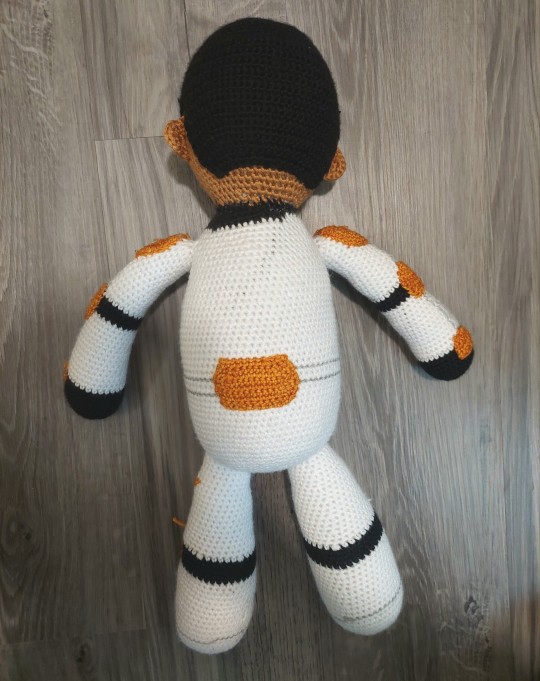
Yarn Weight: 4
Hook: 4 mm
Colors:
White
Yarn in Jango’s skin tone (I used Lion Brand Yarn’s Skein Tones yarn in adobe)
Black
Dark brown (for scar; contrasts with skin tone)
212th gold/orange (this can be hard to find. I got mine at a local independent store)
Grey
Extra materials:
Buttons and thread OR safety eyes (I used buttons because I like the look of them better)
Stitch markers
Yarn needle
Abbreviations Key:
Ch – chain
Dec – decrease
FO – fasten off
Inc – increase
Rep from * – repeat from *
Sc – single crochet
Sc2tog – single crochet two stitches together
Ss – slip stitch
St – stitch
Additional Notes:
All parts save for some embellishments are worked in the round. It is recommended that the crocheter mark each round for clarity.
Entire doll is worked in single US crochet.
Magic circle is NOT used.
I’m not sure what the gauge is, but mine is quite tight. Use a smaller hook if you feel as though your gauge is too loose.
BODY AND HAIR
Head– in adobe
1. Chain 2. Into the first st, sc 6 and mark with a stitch marker. (6) 2. Sc2 into each sc around. Mark. (12) 3-6. Increase by 6 each round to 48. (48) 7. Sc around. (48) 8. Inc by 6 (54) 9. Sc around. (54) 10. Inc by 6. (60) 11-12. Sc around. (60) 13. Inc by 6. (66) 14-15. Sc around. (66) 16. Inc by 6. (72) 17-18. Sc around. (72) 19. Dec by 6. (66) 20-21. Sc around. (66) 22-34. Dec by 6 in same pattern as increases. FO after crocheting 12 at row 34. Stuff firmly.
Body– in white, grey, black
1. In white, ch2 and sc6 into second st from the hook. Mark. 2-12. Inc by 6 each round to 72. (72) 13-23. Sc around. (72) 24. Sc29 and FO. Ss in with grey and sc14. FO. Ss in with white and finish round. (72) 25. Sc30 and FO. Ss in with grey and sc12. FO. Ss in with white and finish round. (72) 26. Sc31 and FO. Ss in with grey and sc10. FO. Ss in with white and finish round. (72) 27. Sc32 and FO. Ss in with grey and sc8. FO. Ss in with white and finish round. (72) 28. Sc33 and FO. Ss in with grey and sc6. FO. Ss in with white and finish round. (72) 29. Sc34 and FO. Ss in with grey and sc4. FO. Ss in with white and finish round. (72). 30-41. Sc around in white. (72) 42. Dec by 6. (66) 43. Sc around. (66) 44. Dec by 6. (60) 45. Sc around. (60). 46. Dec by 6. (54) 47. Sc around. (54) 48. Dec by 6. (48) 49. Sc around and FO. (48) 50. In black, ss in and dec by 6. (42) 51. Dec by 6. (36) 52. Dec by 6. (30) 53. Dec by 6. (24) At this point, stuff the body firmly. 54. Dec by 6. (18) 55. Dec by 6. (12) 56. Sc around and FO, leaving a long tail, enough to sew the head on. (12) Using grey yarn and a yarn needle, stitch a trooper’s upper chest plate shape (from beginning of black area to about round 45, 5 rows above the grey shape). Center it above the grey shape. Also stitch a belt shape below the shape, shifting to a row below in the middle of the back. For chest plate pattern, see diagram #4. For how to stitch a pattern in, see diagrams #1-3.
Arms– in white, black (make 2)
1. In black, ch2 and sc6 in second ch from hook. Mark. (6) 2. Sc2 in each st around. (12) 3. Inc by 6. (18) 4. Inc by 6. (24) 5. Inc by 6. (30) 6-9. Sc around. (30) 10. Dec by 2. (28) 11. Sc3 and FO. Ss in white and finish the round. (28) 12-14. Sc around. (28) 15. Dec by 2. (26) 16-19. Sc around. (26) 20. Dec by 2. (24) 21-24. Sc around. (24) 25. Dec by 1 and sc3. FO. Ss in black and dec by 1, finishing the round. (22) 26-27. Sc around. (22) 28. Sc3 and FO. Ss in white and finish the round. (22) 29. Sc around. (22) 30. Dec by 2. (20) 31-34. Sc around. (20) 35. Dec by 2. (18) 36-39. Sc around. (18) 40. Dec by 2. (16) 41-44. Sc around. (16) At this point, stuff the arm. 45. Sc2tog around. FO, leaving a long tail. (8)
Legs– in white, black (make 2)
1. In white, ch2 and sc6 into the second ch from hook. Mark. (6) 2-7. Inc by 6 to 42. (42) 8-13. Sc around. (42) 14. Dec by 2. (40) 15-16. Sc around. (40) 17. Dec by 2. (38) 18-19. Sc around. (38) 20. Dec by 2. (36) 21. Sc around. (36) 22. Sc3 and FO. Ss in black and finish round. (36) 23. Dec by 2. (34) 24-25. Sc around. (34) 26. Dec by 1, sc2 and FO. Ss in white, sc10, and dec by 1. Finish round. (32) 27-28. Sc around. (32) 29. Dec by 2. (30) 30-31. Sc around. (30) 32. Dec by 2. (28) 33-34. Sc around. (28) 35. Dec by 2. (26) 36-37. Sc around. (26) 38. Dec by 2. (24) 39-40. Sc around. (24) 41. Dec by 2. (22) 42-43. Sc around. (22) 44. Dec by 2. (20) 45-46. Sc around and FO, leaving a long tail. (20) Stuff firmly. Using the yarn needle and grey yarn, stitch in a grey line about 10-11 rows above the starting circle. This is meant to delineate feet.
Hair– in black
1. In black, ch2 and sc6 into the second ch from hook. Mark. (6) 2-9. Inc by 6 to 54. (54) 10. Sc around. (54) 11. Inc by 6. (60) 12. Sc around. (60) 13. Inc by 6. (66) 14. Sc around. (66) 15. Inc by 6. FO. (66) Turn the dome inside out, so the backs of the stitches are facing out. Ss into the last st made. 16. Working right back along the last row, (sc48 and ch1)*, turn. (48) 17-23. Rep from *, turning each time. FO. (48) 24. Ss in at 7 sc in from the end of the last row and sc to the same on the other side, turn. (36) 25-26. Sc36, turn. (36) 27. Dec by 2 across row, turn. (34) 28-29. Sc across, turn. (34) 30. Dec by 2 across row, turn. (32) 31-32. Sc across, turn. (32) 33. Dec by 6 across row, turn. (26) 34. Sc across, turn. (26) 35. Dec by 6 across row, turn. (20) 36. Sc across and FO. (20) Turn right-side-out again. At this point, attach all limbs and the head to the body with the tails from the body and limbs. Don’t attach the hair until the ears are done. Attach with the seams from white-black transitions on limbs facing up and out for the legs and to the back for the arms. These will be covered with armor embellishments.
EMBELLISHMENTS
Pauldrons– in 212th gold/orange (make 2)
1. In 212th gold/orange, ch2 and sc6 into the second ch from hook. Mark. (6) 2-5. Inc by 6 to 30 and FO, leaving a long tail. (30) Attach to the tops of the arms in the shoulder area. Tuck in ends.
Leg pads– in 212th gold/orange (make 2)
1. In 212th gold/orange, ch3 + 1 for turning. Turn. (3) 2. Inc by 1, sc1, inc by 1, turn. (5) 3. Sc across, turn. (5) 4. Inc by 1, sc3, inc by 1, turn. (7) 5-7. Sc across and turn. (7) 8. Dec by 1, sc3, dec by 1, turn. (5) 9. Sc across and turn. (5) 10. Dec by 1, sc1, dec by 1, FO, leaving a long tail. (3) Attach to the legs where the black meets white and vice-versa. Tuck in ends.
Handguards– in 212th gold/orange (make 2)
1. In 212th gold/orange, ch5 + 1 for turning. Turn. (5) 2. Sc across, turn. (5) 3. Inc by 1, sc3, inc by 1, turn. (7) 4. Sc across and turn. (7) 5. Sc across and FO, leaving a long tail. (7) Attach over the backs of the hands where black meets white. Tuck in ends.
Back panel– in 212th gold/orange (make 1)
1. In 212th gold/orange, sc10 + 1 to turn. Turn. (10) 2. Inc by 1, sc8, inc by 1, turn. (12) 3. Inc by 1, sc10, inc by 1, turn. (14) 4-8. Sc across and turn. (14) 9. Dec by 1, sc10, dec by 1, turn. (12) 10. Dec by 1, sc8, dec by 1, turn. FO, leaving a long tail. (10) Attach to the back where the belt stitching jumps a row. Tuck in ends.
Elbow pads– in 212th gold/orange (make 2)
1. In 212th gold/orange, sc2 + 1 for turning. Turn. (2) 2. Inc by 1, inc by 1, turn. (4) 3. Sc across and turn. (4) 4. Inc by 1, sc2, inc by 1, turn. (6) 5. Sc across and turn. (6) 6. Dec by 1, sc2, dec by 1, turn. (4) 7. Sc across and turn. (4) 8. Dec by 1, dec by 1 and FO, leaving a long tail. (2) Attach to the backs of the elbows where white meets black and vice-versa. Tuck in ends.
Ears– in adobe (make 2) – You want to make a half-circle
1. In adobe, ch2 and sc6 into the second ch from hook. Mark. (6) 2. Sc2 into the first 3 st of the round to make 6 st and ch1 to turn. Turn. (6) 3. (Inc by 1 + 1 sc) 3 times and FO, leaving a long tail. (9) Using the yarn needle, sew each ear onto either side of the lower half of the head, leaving room for the hair to go on. At this point, attach the hair. Using the yarn needle and grey yarn, stitch in grey stripes on Cody’s arms.
SUNBURST
Central ray– in 212th gold/orange (make 1)
1. Sc4 + 1 for tuning. (4) 2-10. Sc across, turn. FO, leaving a long tail. (4) Attach to the top of the grey shape on the chest, pointing up. Tuck in ends.
Side and bottom rays– in 212th gold/orange (make 3)
1. Sc4 + 1 for tuning. (4) 2-7. Sc across, turn. FO, leaving a long tail. (4) Attach to the sides and bottom of the grey shape. Tuck in ends.
Ray tops, for side rays– in 212th gold/orange (make 2)
1. Sc4 + 1 for tuning. (4) 2-3. Sc across, turn. FO, leaving a long tail. (4) Attach to the tops of the side rays, leaving a small white space between the top of the rays and the ray tops. Tuck in ends.
FACE
Eyes
Buttons: using a sewing needle, attach the buttons to the yarn stitches so that they form eyes.
Safety Eyes: if using safety eyes, attach as normal in the desired position.
Eyebrows
Using the yarn needle with black yarn, form the eyebrows. Cut the yarn and tie the ends together. Pull the yarn so that the knot in on the inside of the crochet and not facing out.
Scar
Using the yarn needle with dark brown yarn, stitch Cody’s scar in.
DIAGRAMS/PICTURES
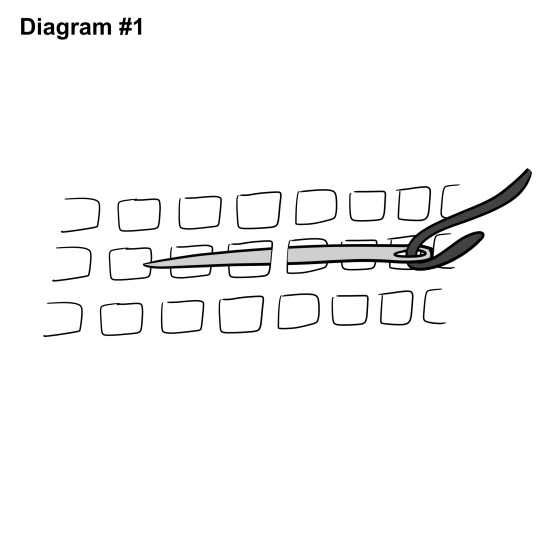
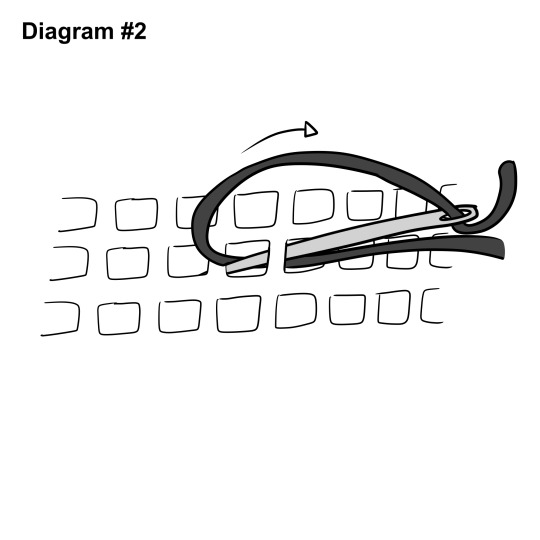
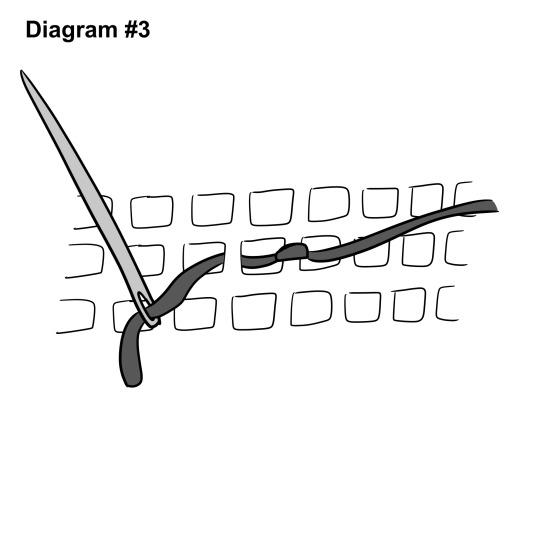
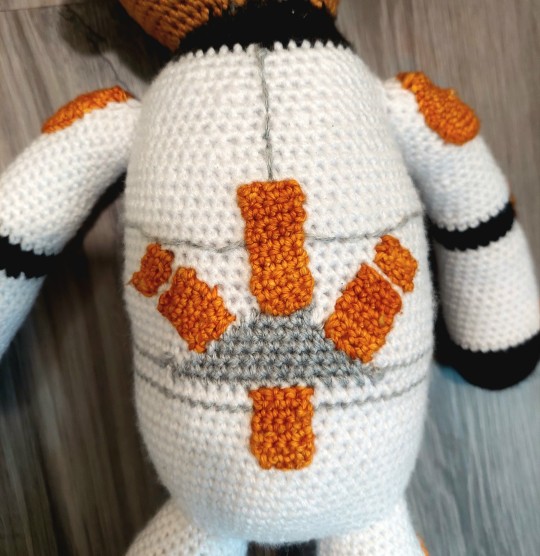
#star wars#commander cody#marshal commander cody#cc 2224#star wars the clone wars#the clone wars#swtcw#tcw#crochet#amigurumi#crochet doll#crochet pattern#beans art#considering making smaller trooper dolls but im likely to sell those patterns#this one is free though :)
56 notes
·
View notes
Text
I've seen a lot of pictures of this Anomalocaris toy, but too few that look really cool, so I ordered one and took it to the beach for a photo shoot =D


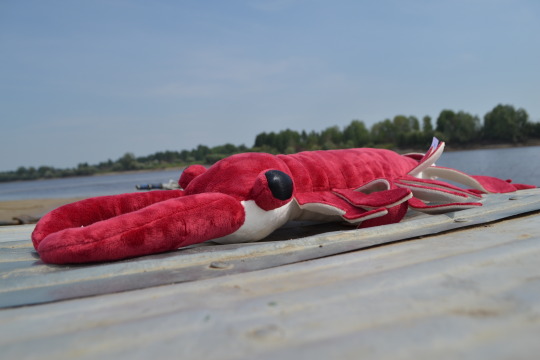

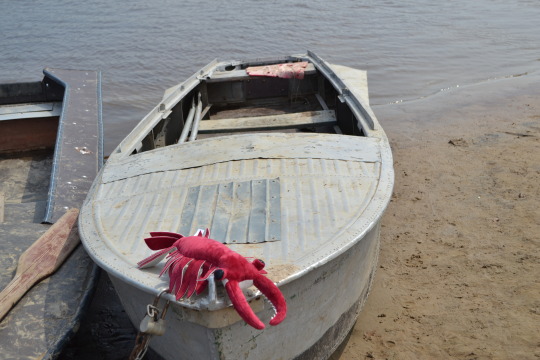
I think it's funny ^_^
Anomalocaris (toy) 11.07.2023
Nikon D3100 18-55 mm
#paleontology#anomalocaris#photography#beach#plush#cute#paleomedia#scenery#boat#prehistoric#anomalopost#nikon
90 notes
·
View notes
Note
you were in Iceland?? epic! I've been there as well (in 2022), how was it? how was the volcano? (if you don't mind me asking, feel free to ignore this)
Yes! I was there 5/18 to 6/1. I've wanted to go for like a decade and have been semi planning this trip for 2024 for a year and a half, then properly researching and planning since January. It was SO AMAZING. Exactly everything I wanted :) I was ready to go home at the end for like, my own bed and some rest, but now I miss it and want to go back lol
If you went in 2022, did you get to hike to the Fagradalsfjall eruption? I know those were the "tourist" ones that people could get closer to. The current eruptions are part of another volcanic system on the Reykjanes peninsula, Svartsengi. They aren't open for hiking. It erupted again 3 days before I left. I got to see it twice! On our last full day we drove out of Reykjavik and saw it along the highway, and then the day we left we stopped on the way to the airport. I took this with my 250 mm from literally the side of the highway:

It caused no interferences with our travel. It's a fissure eruption, so the lava is erupting along a fissure and isn't as big and explosive. Initially they were afraid this one might disrupt air travel if the lava flowed to the sea (producing more ash and steam) but it didn't. It was very cool to see! I feel bad for the people who lived in Grindavik though, it’s been months since they had to evacuate and there isn't an end in sight for them yet. The Icelandic government really stays on top of things like road closures, weather reporting, etc so I checked their websites daily. The main concern with the eruption as gas pollution, so I just checked their pollution forecast to see if the wind was going to blow it over us or not (it didn't.)
Our trip went great. We had mostly good weather and apparently left just in time because this last week there's been a pretty nasty problematic storm across the whole country that left a bunch of people stranded. But we left 2 days before that. We drove 3,300 km in our rental car (2,050 miles) and did the entire ring road + some of the Westfjords + Snæfellsnes + Húsavik + Borgarfjörður Eystri as detours. Our rental car was named Jim because that was his license plate. We bonded with him lmao
Here's a few photos :)









Major things I did: Katla Ice Cave, Vestmannaeyjabær, Silfra snorkeling in 2°C water, Jökulsárlon boat tour, Húsavik whale watching, countless waterfalls, puffins at Borgarfjarðarhöfn, Hvammsvik hot springs & Sky lagoon, and Mulagljufur Canyon.
It was at coldest, 2°C (35°F) with downpour rain being pushed sideways into your face by wind to the point you could hardly open your eyes. It was at hottest 19° C (66°F) and sunny. We mostly got great weather, it was only one day that was particularly bad. Mostly it was between 7°C - 13°C (45°F - 55°F) the whole time.
I NEVER saw it get dark and that was a novelty to me the entire trip. Like it never settled in as something I got used to. Presumably it got mostly dark somewhere around 2 am but I was always asleep by then and even if I woke up to go the bathroom, it'd be like 4 am and already light again. The furthest north we stayed was Ísafjörđur, and according to timeanddate.com by May it never reaches full dark, only civil twilight for 3 hours and daylight the other 21. I can't imagine if I'd actually have been there during the solstice, with just that extra month for the days to be even longer!
Now I want to go back for a short winter trip to see the northern lights and then for a proper summer trip to see the highlands (closed the whole time we were there for thawing season)
#quara asks#i think my favorite was the puffins i've literally loved them since i was a kid but never seen one#like i had a beloved stuffed animal puffin named puffy whom i played with constantly#and i saw them! EVERYWHERE!#it was a colony of like 8000 and we went at night when theyre all back from hunting at sea and there was just. hundreds#close enough to touch (i obviously didnt) but omg#i watched them for an hour and half and would've gone longer but i really had to pee LOL#theyre so cute....#also loved that i got to see a wild arctic fox! theyre somewhat rare to see because they're secretive
20 notes
·
View notes
Text






Sanrio 18-55 mm flash camera
#sanrio#sanrio png#sanrio aesthetic#transparent png#transparents#cute pngs#hello kitty png#soft pngs#pink png#pink pngs#sanrio edits png#transparent pngs#transparent#camera#photograph#photography#sanriocore#sanrio core#sanrio art#hello kitty aesthetic#my melody aesthetic#cinnamoroll#cinnamoroll png#hello kitty sanrio#hello kitty#kuromi#kuromi aesthetic#pompompurin#pochacco#no source link
332 notes
·
View notes
Text
The Making of the Howl Jacket (Tutorial)
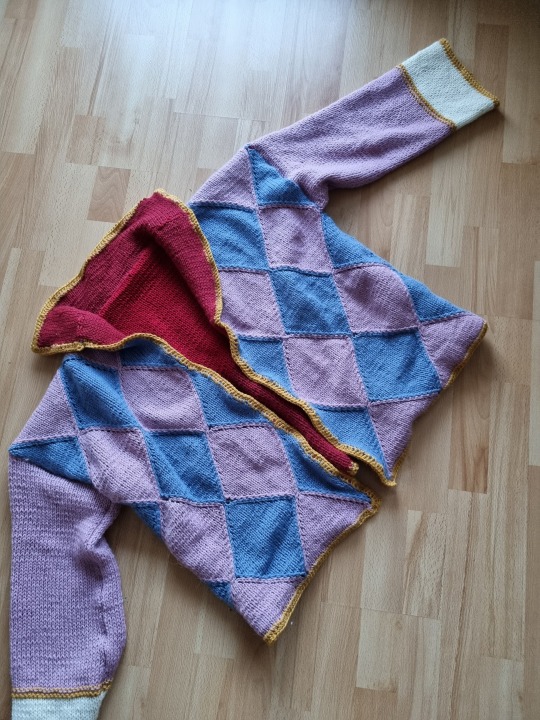
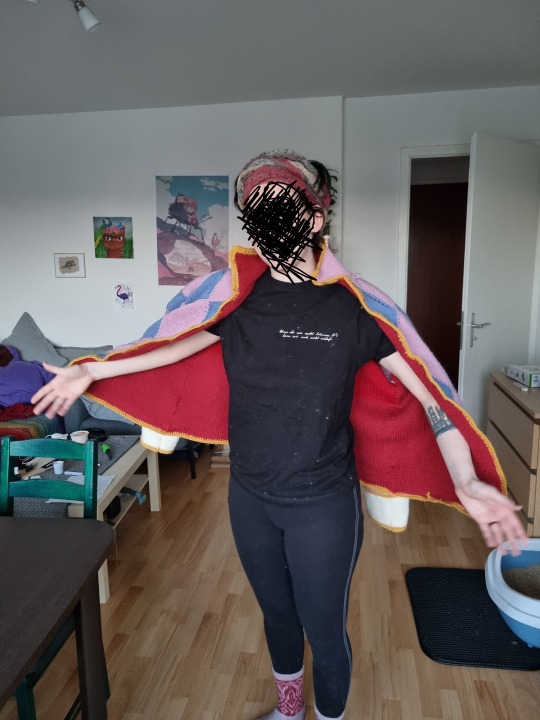
Many People have been asking me about how I did my Howl (inspired) jacket, so here it goes:
(obligatory disclaimer that I am just some person and not a professional pattern maker or anything)
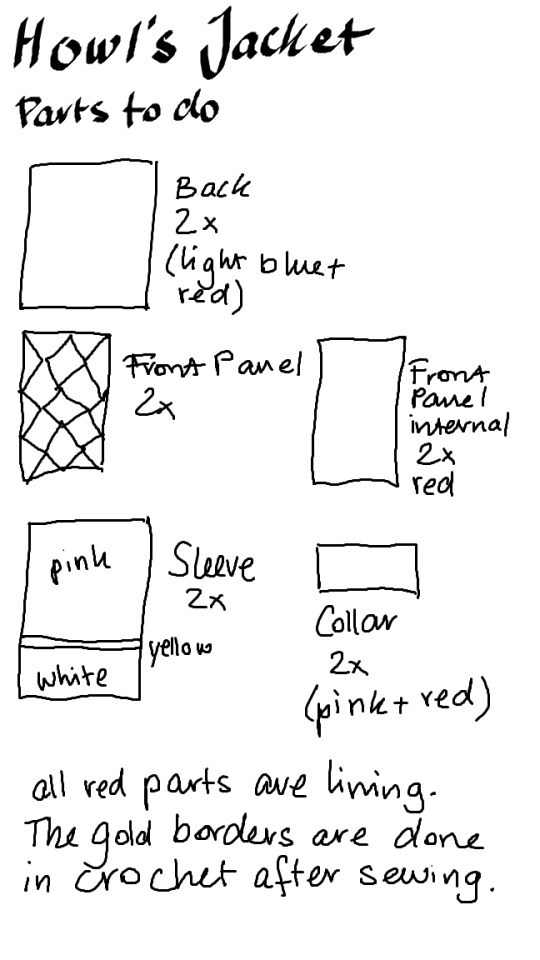
This is an overview of the parts I did. Note that I did no lining for the sleeves because I felt it would be overkill (and strand me on sleeve island forever).
So, let's get technical:
I used Drops Nepal (65% wool, 35% alpaca) and 5 mm needles.
pink (6 balls)
light blue (7 balls)
red (9 balls)
yellow (2 balls)
white (1 ball)
however I was a dumbass and only ordered 6 red balls so there is a colorshift on the backpanel of the lining.
The knitting:
All the pieces are rectangular and mostly in stockinette stitch. I had most trouble with the front panel which also changed the most after blocking, so I would recommend starting with them. Also block the pieces as you go and pay attention to the dimension you block them to.
Frontpanels (outer and lining):
Cast on 55 stitches.
For lining: work flat for 120 rows (or until desired length. Mine are 32 cm wide and 60 cm high)
For outer layer: work 1 stitch blue, 26 pink, 1 blue, 26 pink, 1 blue from seperate balls of yarn. Then work increases and decreases like I outlined here.
This will lead to you having odd stitches of blue and even stitches of pink. When you come to the tips of the pink diamonds, cross them over like you would with cables (1/1 left over right). On the tips of blue diamonds you can slip one, knit two together and slip the first stitch over to make 3 into 1 stitch.
Backpanels (outer and lining):
Cast on 100 stitches, work flat for 120 rows (or until desired length. mine are about 60 cm high and 65 cm wide)
Collar (outer and lining):
Cast on 109 stitches, work flat for 18 rows.
Sleeves:
Cast on 60 stitches, work flat in pink for 72 rows (about 35 cm), then work 3 rows in GARTERSTITCH in yellow (this will raise the yellow off the flat part) followed by 18 rows white.
You can either work the crochet border immediately (2 rows of single crochet) or after you sewed the sleeves together.
Congrats! You did all the parts!
The construction:
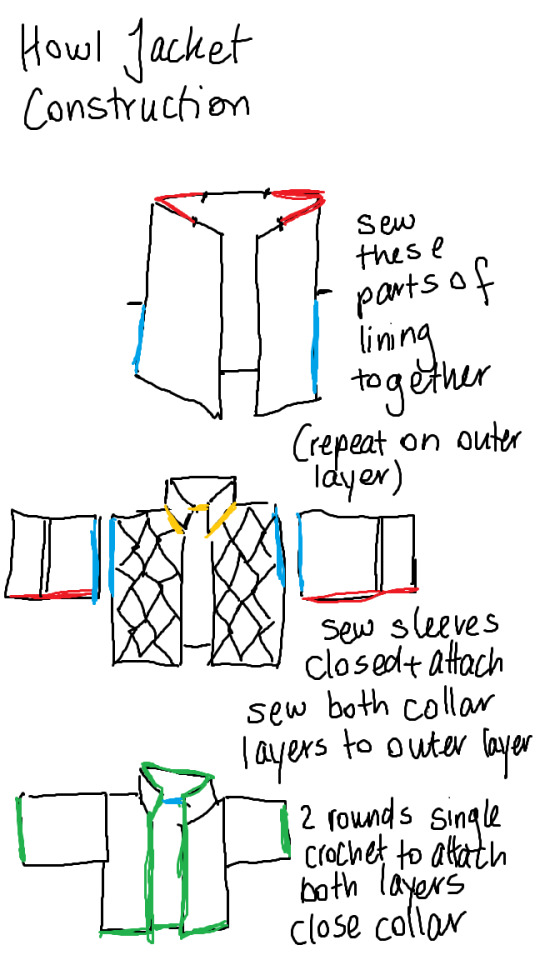
sew the front panels to the back panels. leave 20 cm on the backpanel and 10 cm of each front panel open for your neck to fit and attaching the collar. leave about 30 cm open to attach the sleeves. do this on the lining AND the external layer.
sew sleeves closed and attach to both lining and outer layer at the same time. attach collar on both layers seperately (outer and lining).
Finish off the edges by doing two rows of single crochet.
Weave in all your ends and DONE!
Some detail photos for you:
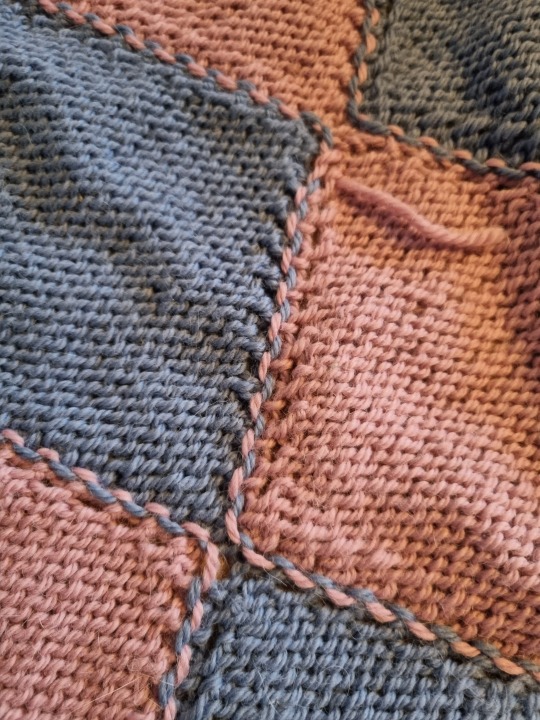
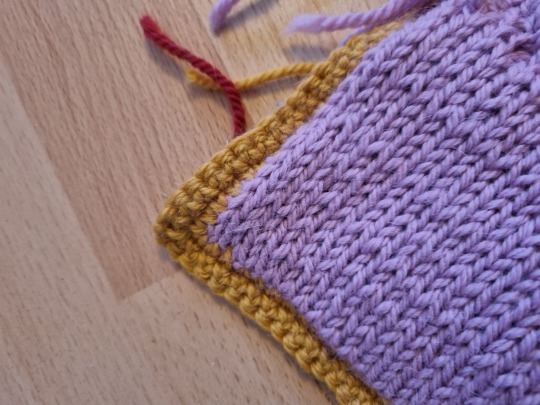
36 notes
·
View notes
Text
[NOTICE] TOMORROW X TOGETHER '2024 SEASON’S GREETINGS'' Release Announcement
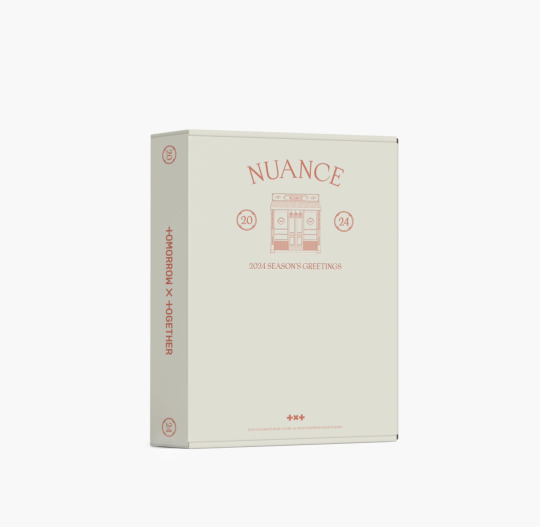
We would like to inform you of the release of <2024 SEASON’S GREETINGS> by TOMORROW X TOGETHER, a collection of scenes of youth painted in their distinct colors.
The 2024 SEASON’S GREETINGS presents the delicacy and subtle nuance of youth, which is beautiful because it is easily swayed, in the TOMORROW X TOGETHER’s way.
The boundless and romantic moments of the members are included in the photo book, and in the DIGITAL CODE, you can meet a variety of special programs, such as “Relay Drawing” and “MC TOMORROW X TOGETHER Show,” where members become MCs.
Plus, the package is made more special by the addition of a desk calendar, photo card set, square stickers of colorful moments, and sentimental paper mobile.
TOMORROW X TOGETHER’s unfamiliar and yet a forlorn scene “TOMORROW X TOGETHER 2024 SEASON’S GREETINGS” will be available for pre-order from November 28 and officially released on January 22, 2024.
※ Register/verify the digital code enclosed with this merchandise to watch the video and obtain the digital planner through Weverse Collection. For more information, please refer to the <TOMORROW X TOGETHER 2024 SEASON’S GREETINGS> viewing guide released at 6 pm (KST) on December 17!
[PRE-ORDER DATE] - From 11AM, Tuesday, November 28, 2023 (KST) *WHILE SUPPLIES LAST*
[RELEASE DATE] - Weverse Shop GLOBAL : December 18, 2023 (KST) - Weverse Shop US : January 22, 2024 (PST) - Weverse Shop JAPAN & UNIVERSAL MUSIC JAPAN : January 11, 2024 (KST)
*Online Retailers: December 18, 2023 (KST) - Kakao Talk Gift - MUSICPLANT - KYOBO BOOK CENTRE(HOTTRACKS) - Aladin - YES24
- OUTBOX Size: 210 x 310 x 45 mm *This box is designed to protect the product. We cannot provide an exchange or a refund due to stains or damage on the box sustained during the distribution process.
[SPEC] 1. DESK CALENDAR Size: 130 x 235 mm / 28p 2. SCHEDULER Size: 125 x 185 mm / 64p 3. PHOTOBOOK Size: 125 x 185 mm / 88p 4. DIGITAL CODE SET DIGITAL CODE Size: 27 x 85 mm / About 60 mins PAPER Size: 45 x 110 mm / 1ea [144p], [270p], [360p], [480p SD], [720p HD], [1080p FHD] KOREAN, ENGLISH, JAPANESE, CHINESE *This product is made of recycled plastics. Furthermore, natural phenomena such as tiny spots and parting lines may occur naturally as part of the manufacturing process in some products, and they are not considered defects. 5. POSTCARD SET POSTCARD Size: 100 x 150 mm / 5ea ENVELOPE Size: 110 x 160 mm / 1ea 6. PHOTOCARD SET Size: 55 x 85 mm / 10ea 7. FOLDED POSTER Size: 297 x 420 mm / 1ea 8. STICKER SET Size: 130 x 190 mm / 2ea 9. PHOTO FRAME CARD SET FRAME Size: 95 x 95 mm / 1ea CARD Size: 65 x 55 mm / 4ea 10. PAPER FOLDER FILE Size: 195 x 290 x 10 mm / 1ea 11. PAPER MOBILE Size: 150 x 210 mm / 1ea 12. MEMO PAD Size: 70 x 120 mm /30sheets

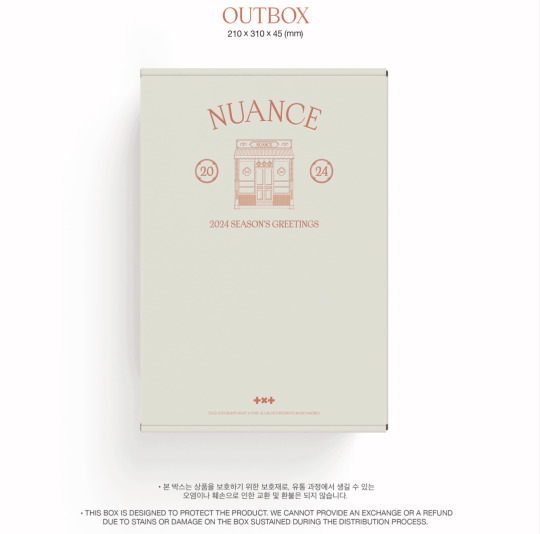
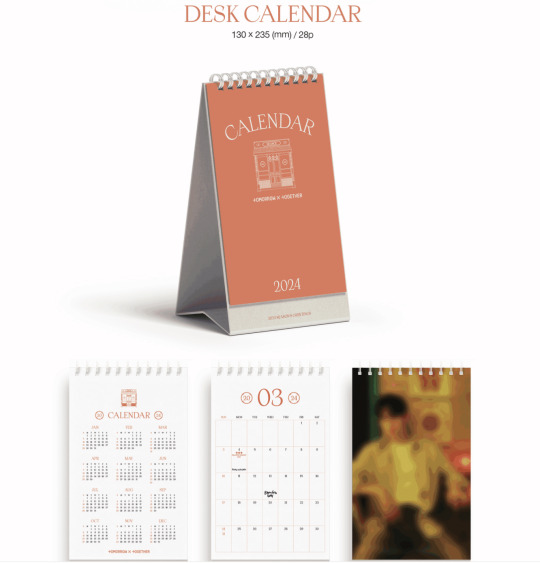
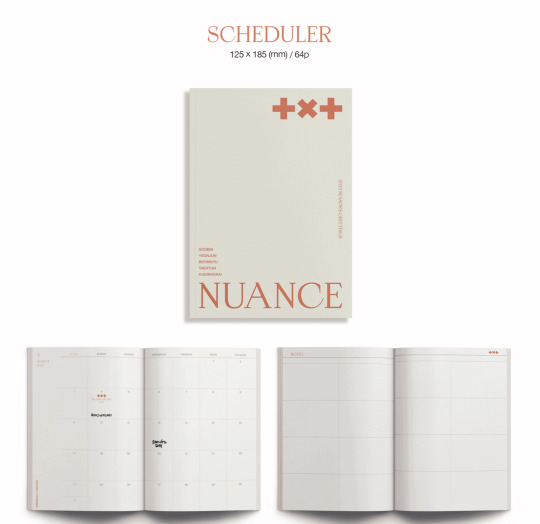


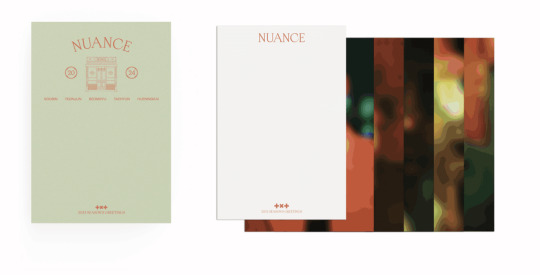




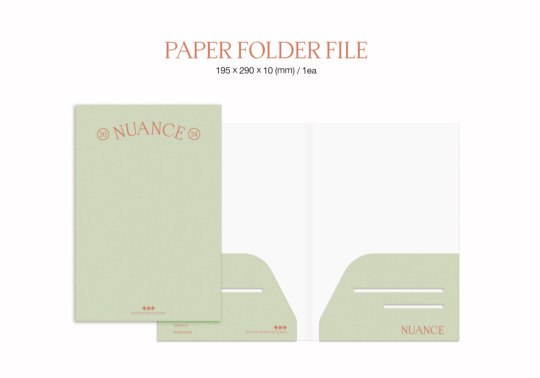
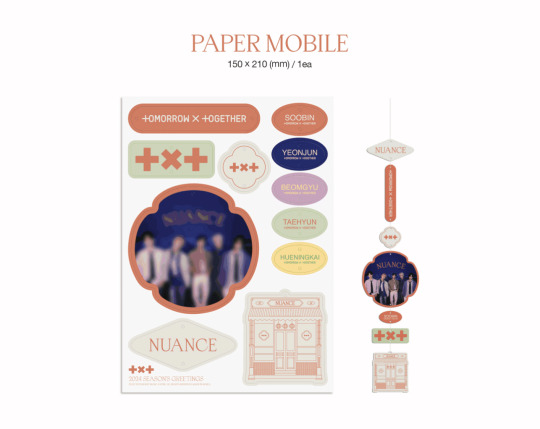
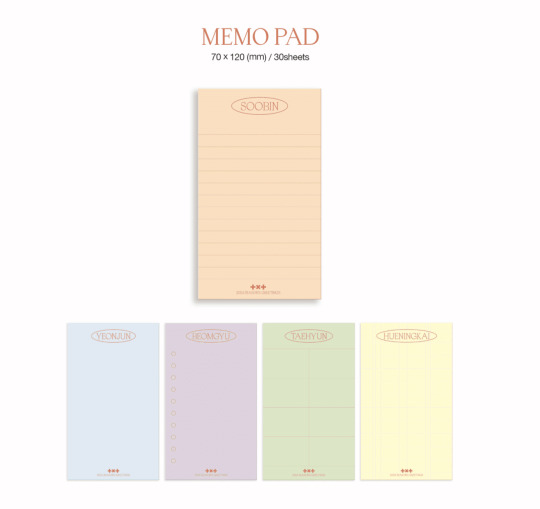

#txt#tomorrow x together#231127#weverse#notice#soobin#yeonjun#beomgyu#taehyun#hueningkai#2024 seasons greetings#seasons greetings
23 notes
·
View notes
Photo










2 notes
·
View notes
Text

Traditional Japanese Yakatabune Boat
Location: Kishimachi Promenade, Minatomirai, Yokohama Timestamp: 20:18 on July 23, 2011
Nikon D3100 + NIKKOR 55-300mm f/4.5-5.6 300 mm ISO 100 for 1/320 sec. at ƒ/8
Although captured more than a decade ago in 2011, I still find joy in the elegant pleasure boats navigating the intricate canals that flow into the Port of Yokohama on Tokyo Bay.
Despite the grainy texture and abundant noise in the photograph, the harmonious color palette continues to be a visual delight to my eyes.
Historical records harking back to the Heian Period (794 to 1185) mention the existence of pleasure boats, a domain primarily enjoyed by nobles who reveled in poetry, music, and dining along rivers and ponds.
The Edo Period (1603 to 1867) witnessed an expansion in the use of pleasure boats catering to samurai, their families, and aristocrats. It was during this era that the iconic design of roofed boats adorned with red lanterns gained popularity.
In the present day, yakatabune boats (屋形船) are a source of enjoyment for both locals and international tourists. Springtime offers enchanting cruises along rivers adorned with cherry blossoms, while summer invites you to cruise into the Port of Yokohama for exclusive, panoramic views of vibrant fireworks and the Yokohama skyline.
While these boat cruises departing from the Minatomirai waterfront district in Yokohama are not overly expensive, they may not be the first choice for budget-conscious travelers. A two-hour lunch cruise is priced at 6,500 yen, and a three-hour dinner cruise costs 14,500 yen.
More details and links to sites where you can book reservations:
https://www.pix4japan.com/blog/20110723/mm21-boats-bridge
13 notes
·
View notes
Note


60. how are you?
3- yeah but I think it's more of the thought of them than their actual self 4-Going to university and studying psychology 5-my frens/moots 6-My bad memory is both a blessing and a curse, but with the power of forgetting comes the guilt of not remembering
7-genuinely think it was the worst year of my life lol, i can't imagine going through that again 8-Yeah, i cry easily in general lol 9-Does my sister count 10-Very, mostly because my base facial expression is :| so unless im trying hard to mask, or you know me well, you will not know lol 11- Nope, i forgot to put it on but im wearing my headphones 12-To wake up as a random cis boy 13- a little scared/paranoid, but distracting myself with tumblr
15- No self awareness, bad memory, smart dumbass, irresponsible, cringe, sincere, accomadating, i will yap for 100 years or not at all, no inbetween 16-I mean, hasn't everyone 17-They suck to have but they exist and i think its normal to have one thing ur insecure about [as long as you don't obsess over it] 18-Kind of? Like if i could choose different options. But if i couldnt choose then HELL NO 19-nope 20-
21- 14, 27/11/2009 [dd/mm/yyyy] 23- my friends hating me, forgetting, never being okay 24-166cm
25-My friends, not even joking 26-again, my friends 27- feeling negative feelings, people being assholes for no reason, my memory 28-If you're my friend and your vibe isnt bad 29- The lorax 30-Hazbin/murder drones 31- A) The epidermis can't bleed, it has no blood vessels B) Hitler was high for most of WWII C) Theres proof that hitler might have been a closseted gay [and killed people to hide it] Bonus fact: snakes smell with their tongues 32) Used to be mainly guys but im at a single sex school so its girls now 33) To play anything cool, to say no 34) AAAAAAAAAAAAAAAAAAAAAAAAAA 35) Sport 36) A) be a psychologist B) Be a good,happy human C) make my frens happy
37)idk much about acting but that beetlejuice guy is cool as heck 38) Im a basic bitch but john mullaney 39) I love playing all sports, but my favorite is either dodgeball or basketball [this does not mean im good at them though /silly] 40) me and my old family friends would phsycially fight for fun a lot, and so one day as our parents took us to the park, we went on a big hill and we started fighting eachother, and it was a 3 on 1 [well, yeah my sister was there but she didn't fight and all she did was run, so nobody went after her], and i still fucking won, the self esteem boost was crazy
41) *insert joke about me and fictional character* 42) Girl in pieces, i have never not cried when reading it 43) I cant choose 44) i dont talk to people so idk 45)

49) The arcade, playing pump it up 50) that'd dox em and i dont have pics of my moots 51) Sag 52) im kinda good at reading intentions 53) 1-frens 2-music 3-Fanfiction 4-psychology 5-research 54) if i say it i'll get more anxious lol 55) moots=frens 56) Cheese 57)Foxes!!! Especially red or black ones 58) Their username starts with Z, their pfp shows their oc underwater, and they have a don :3 59) I needed to read a fancomic on undertale but i had to make an account
4 notes
·
View notes
Text

„Mildly“ restomodded:
- 320 mm Moto-Master brake disc (front) with 5,0 mm thickness (OEM Sunstar: 4,5 mm) w. SBS sinter pads, Brembo disc rear
- 3/4“ Nissin radial brake pump (from a 675 Street Triple R)
- Clutch assembly from NJ515 model 1050 Speed Triple
- Throttle grip (with shorter stroke) from a NJ515 model 1050 Speed Triple
- Foot rests from a 675 Street Triple R
- Foot rest protectors from an first series NJ515 model 1050 Speed Triple
- Ferrara 2 mirrors
- 190/55 ZR 17 + 120/70 ZR 17 Michelin GP2
- Shorter 18/45 gearing w. DID ZVM-X2 530 S&S chain
- Fully adjustable Wilbers 641 shock
- Revised fork w. K-Tech valve emulators
- Samco silicone hoses for cooling system
- LiFePo battery
On the Todo-list: Replace blinkers w. OEM items; cut off/replace the number plate holder; get the available second set of body parts painted in „Nuclear Red“ and get second set of black rims and Brembo SuperSport discs; eventually get the Wilbers 641 shock modified for a length extension; get the scratches from the available Shark exhaust polished.
5 notes
·
View notes